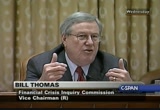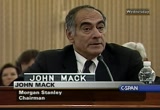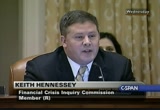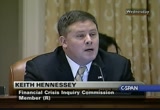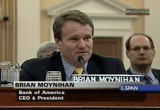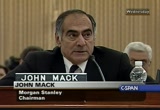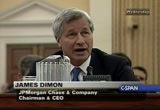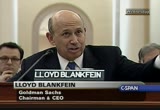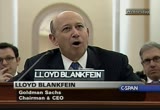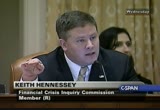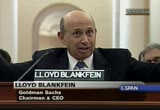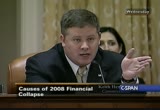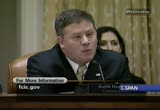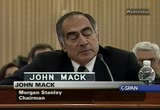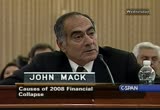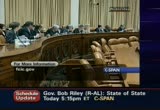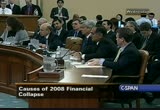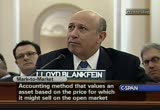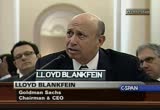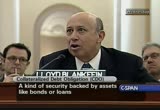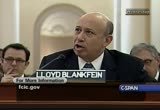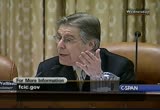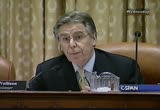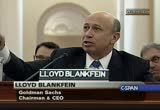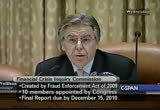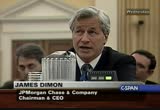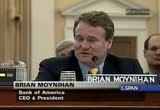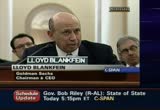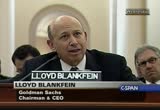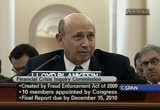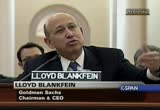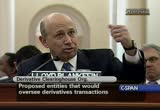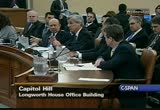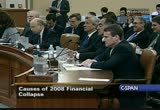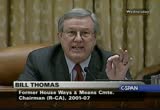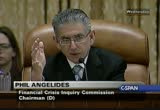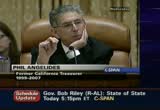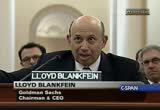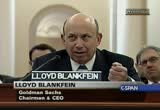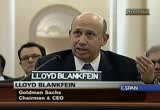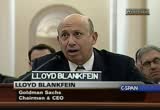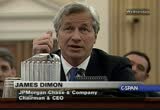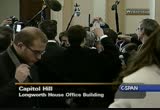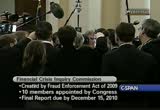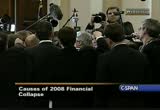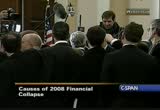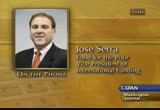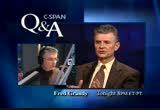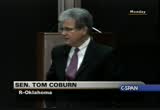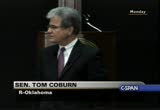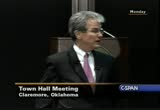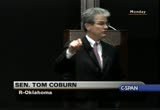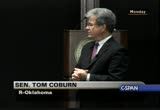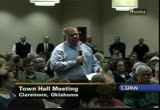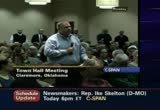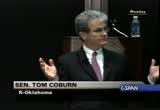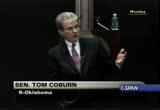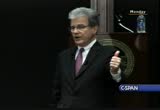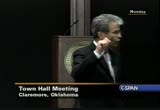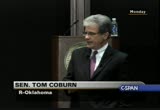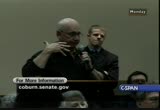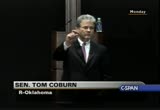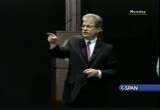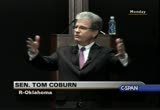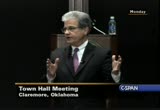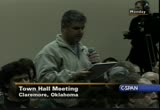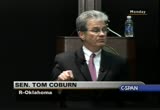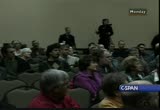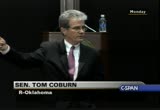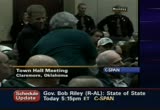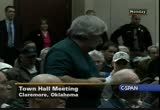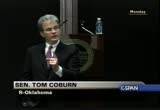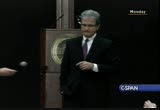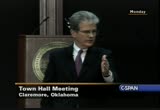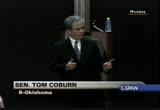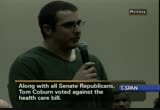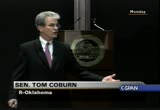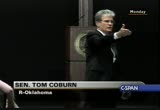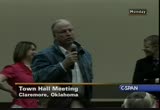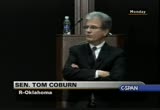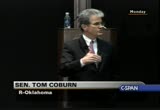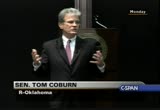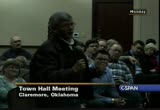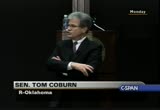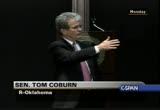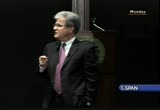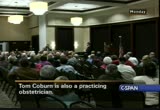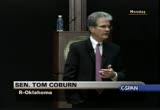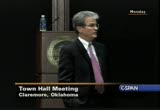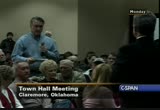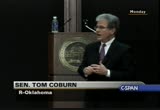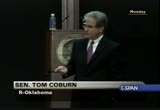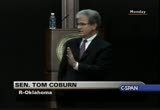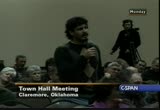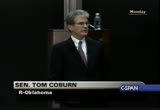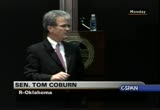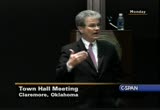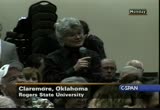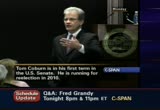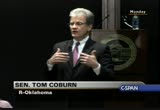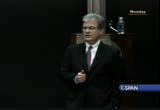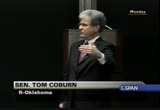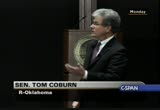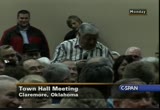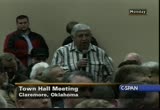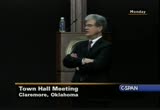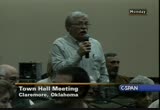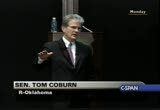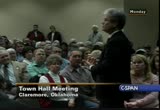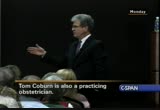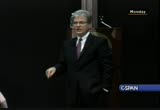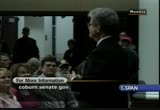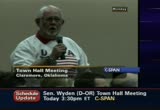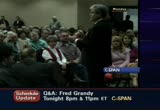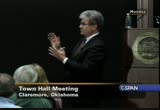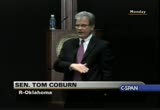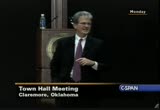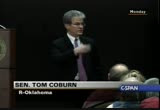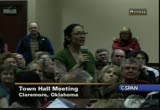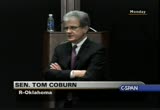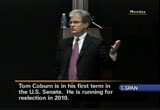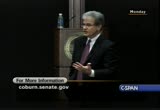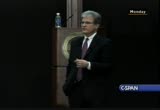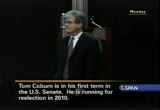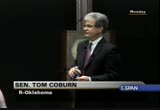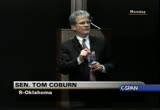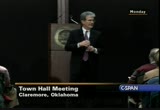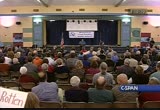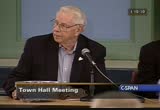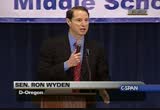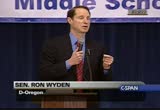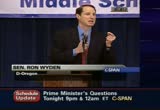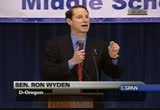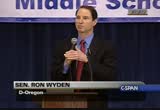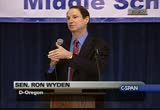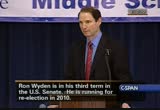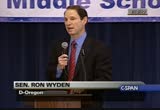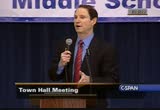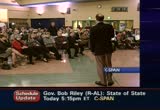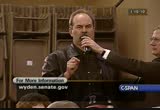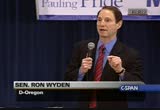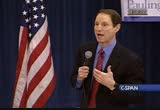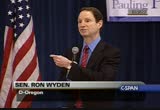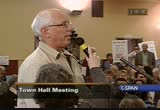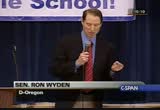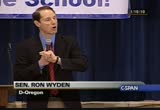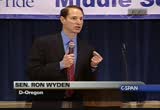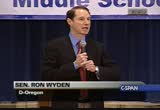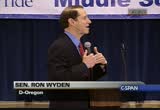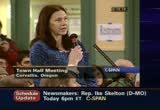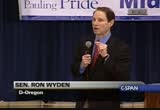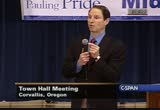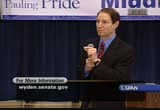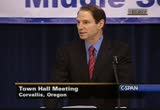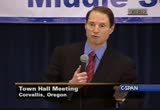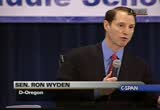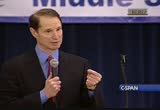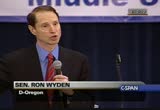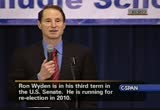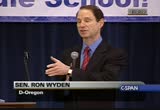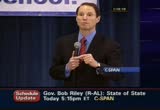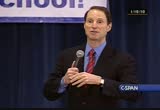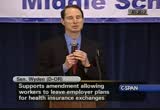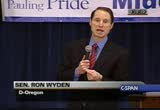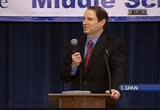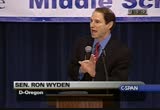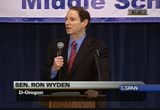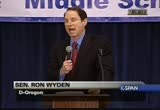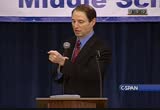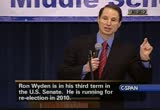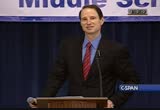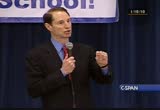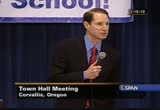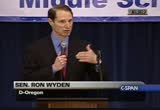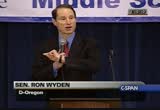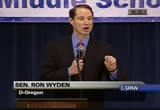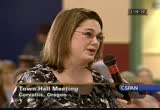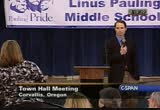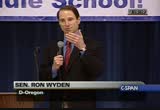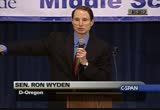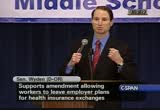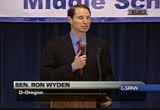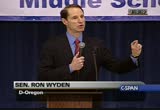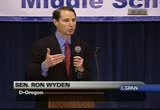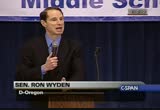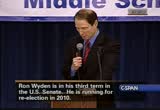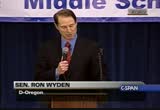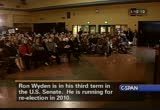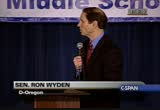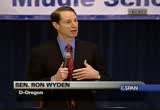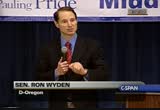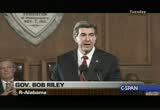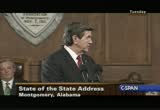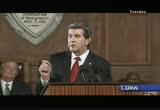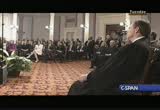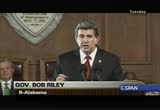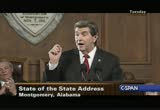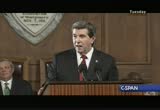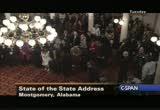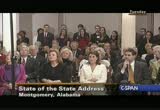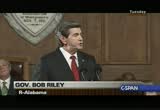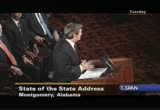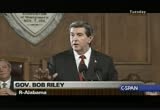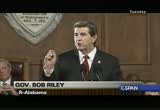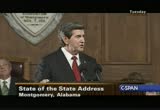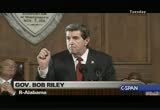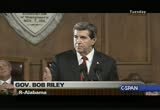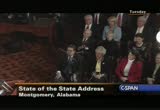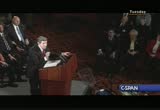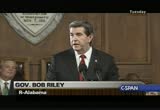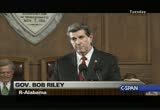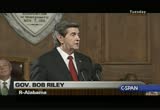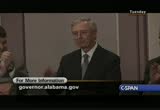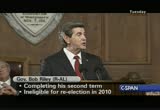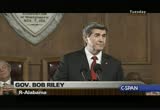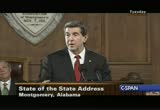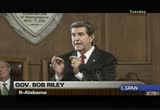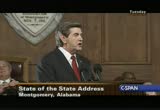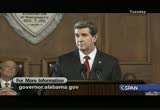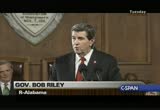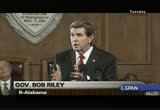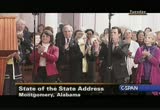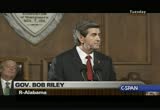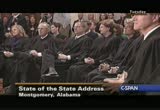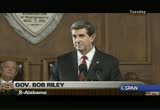tv C-SPAN Weekend CSPAN January 17, 2010 1:00pm-6:00pm EST
1:00 pm
the fundamentals are the same period to what extent can you people talk about simplification so that people can understand or is it an agreement that you will have the fraternity, which gets paid highly and has the jargon -- we run into that a lot in government, in which jordan was used to reduce the number of people they have to interact with -- is that the case in terms of some of the complexity that he is fine now? you get paid more for 100 pages than you do for one. >> that is not. it is more of the engineering and structures of synthetic products. certain products answer certain
1:01 pm
questions or problems that someone is trying to solve for, so all of us are very lucky to have a very smart people, and if there is a problem that an asset manager has and to try to work with them to try to solve that problem -- >> is each one unique? it is something about who gets what, when, and how. >> my colleague talked about some of the products being tailored for specific problems. . . of investing. >> and this costs more than the general. >> thank you, mr. chairman. >>ñpáhank you. mr. hennessy? >> thank you, mr. chairman. i want to focus on the too big to fail question. i think it is interesting that we are talking about risk- management with the four firms
1:02 pm
that survived, whether that was because of your risk-management practices. practices. i am more interested in about risk-management practices at lehman brothers and bear stearns and fannie mae and freddie mac, those as opposed to others that failed and went under. but i think the american people, we do not care about the risk- management practices at home depot or caterpillar, or even the biggest firms, like wal-mart and chevron, because if those firms bail and go under, and they go away, their competitors swoop in, but i think a lot of the problem and a lot of the political blowback -- we could not allow the largest financial firms to fail because of the broaderçó consequences for the economy, so what i want to do is first focus on the perception of the too big to fail question, and a question for each of you, on both investors and managers
1:03 pm
and your board members, and that is in the fall of 2008, do you believe that investors that were investing in your firm where pricing in the possibility that the government might come in and provide assistance? that the government might decide that your firm was too big and too interconnected to fail? and then, the related question, that you talked with other members and board members, to the possibility of the government coming in and rescue your firm, or preventing your firm from failing to enter into those discussions? i am much less interested in whether or not your firm was likely to fail as to whether or not the investors bought more firm was likely to fail to and whether you were discussing with others, well, if things get really bad, we can always count on the government to step in, and that is a question for each of the four of you. let's start on this one side and work our way over. >> in terms of discussions,
1:04 pm
again, i was not party to those discussions. as mr. blankfein earlier said, you would go to bed during the darkest days thinking, it does and does not stop, what will happen? in terms of your views, if you look at the spreads in the debt and comcent, august 2008 to the first quarter of 2009, they will lighten things up dramatically, and therefore, investors would take a position that they were requiring a substantial multiple that they would require by the time the crisis -- an earnest. in some cases, they were as high as 35%. they were factoring in a deep discount. during these times, i do not think any of us in the industry
1:05 pm
thought about the ramifications of what could happen, at least restoring the system in some regard. >> i think lehman brothers allowed to fail, i think with morgan stanley was thinking they were too big to fail. as a result, the stock went down. if they had a view that that was not the case, i think lehman brothers said a wake-up call to any investor out there that the government was here to help you and would get you through this crisis. at the board level, it was never discussed. if we get into where the japanese are not want to put in the money they invested with us, would we be bailed out by the united states government? it was never discussed. >> raise in the question because at no point before the crisis did the markets seem like it was
1:06 pm
too big to fail. -- raising the question. >> mr. dimon, would you move the microphone? i am getting signals. >> i cannot move any closer. i am saying that no part -- at no point was it too big to fail. there is the potential of failure, like any other company. even after they started feeling. indymac, virtual failures in wachovia, bear stearns. even after the government did the stress test and said they do not want these things to fail, it was like they could fail. we never had a conversation ever about relying on the government to do anything. >> i do not recall any internal conversation among the employees or with the board about what we
1:07 pm
would do if we would fail. on the rodentia a big to fail issue, i agree about the sequence. nobody in our country -- company entertained that, and we did not behave that way. we are shareholders. we work for the shareholders, the equity. even the context of too big to fail, if you take bear stearns, that was, quote, rescued, that failed, and all of the shareholders -- that is how we think internally about what constitutes a failure, so for our purposes, they rescue the debt, and equity goes, and that is as much of a failure as anything could be. the external, i think everybody contemplated that the equity could go to zero. that is because that was the pattern, and, in fact, it is interesting.
1:08 pm
there was the idea of big to fail noise that came out, that only came after lehman brothers, not before. it is interesting, because there are always unintended consequences. our shares did not go down to the lows until, for us, after buffett. we did our capital raised the week after the bank holding company at 123. we went down to a low under 50. that was after we got capitalized privately and after the tarp, because at that point, people started thinking they will be quick on the trigger, the debt will get saved, perhaps, and maybe equity would get crushed. maybe we would get into a scenario of the kind of bear stearns, and so, in other words, that puts some pressure on the equity of our shares, which,
1:09 pm
again, went to those lows after the government in certain that money into the firms. >> thank you. a related question, and when we go to this direction now, the capital purchase program and the stress tests drew a line between the 90 or 20 largest firms and everybody else. do you think that drawing that line has changed that perception in the market? do you think that investors now believe that, well, now because my firm was a part of a capital purchase program, because they were a part of the stress tests, because the federal government clearly stepped in and save at the minimum the financial system and, in fact, certain specific firms that there is an implicit put option in the value of your firm and the value of those other 15, 16 firms? >> i just want to say that there
1:10 pm
are only a few minutes. >> we do not behave that way, but that sentiment is in the eye of the person you ask, and maybe some people think like that. and, by the way, post-lehman brothers, which, by the way " was allowed to fail, and congress and the reaction to westering as these firms, i think that has gone a long way -- and the reaction to rescuing these firms. away from the context of the big systemic risk like we had, i think any one of these firms can fail now in the context that we're in now a lot more easily than could have at that moment. >> ok, well, let me ask you a different but related question, which is, do you believe if one of your three counterparts here, if one of your three counterparts messed up, and that firm failed tomorrow, do you think that policymakers would step in and prevent that firm from failing? >> i think tomorrow, in the
1:11 pm
context of this environment, at some levels, the government would intervene. i do not think the equity holders, the shareholders would find any relief from that, but there would be something done because of the fragility of the system today, i believe. >> ok. 1.5 years ago, maybe not. >> all right, quickly, i think mr. dimon mentioned some sort of wind down authority. is that important in legislation? >> mr. chairman, i leave the gentleman 3 additional minutes to be able to pursue the line of questioning. >> yes, i think similar to mr. dimon's comments, so we do not have been left to people speculating, there is a clear path forward, as has been in the fdic process for years and years and years.
1:12 pm
>> we would like not to have the it too big to fail context prevail. >> ok, but on the specific question -- we do not want to have the too big to fill context prevail. -- to fail. >> can you explain to me the difference in views? clearly, there was a view that there were systemically important financial institutions. we now hear the secretary of the treasury, when you're the chairman of the fed, and we hear other people talking about systemic we important financial institutions, and higher standard -- we hear the chairman of the fed. and we hear other people talking about systemically important financial institutions and higher standards. what about the perceptions of
1:13 pm
the policymakers? mr. mack? >> again, i think it was incorrectly that somewhere in the future, one year or two years, clearly, any of these institutions could fail, i think, given how fragile the markets are, not just here, on a global basis. i think that is an issue, so as to go forward, and when i think of ford, i am not just talking about the u.s. economy. -- and when i think of forward, i am not just talking about the u.s. economy. you could get there faster by pulling away this idea of a safety net, but it is more complicated than that. i think that regulators or leaders at the fed or treasury have more insight into what the global problems are and the risks on a global basis, and as
1:14 pm
they work through it, and there are a number of meetings going on right now, trying to figure out what is the right thing to have, i think down the road, this safety net that many believe, and i believe in this particular time frame, it is inflated. i think that will evaporate and will not be needed. what we always learn and not just through the crisis, these markets are connected around the world, and some of them in one part of the world could have a huge impact on here in america or what we do in here impacting on somewhere else, but it will take a lot of work to do due diligence and come up with the right framework to remove the safety wernet, but i think that will happen. >> 15 seconds. there is a significant difference between the increase in perception if a firm will fail and whether or not a put
1:15 pm
option exists. it may be the case that your spreads increase after lehman failed, but@@@@@@ >> thank you, mr. hennessy. mr. wallison? >> thank you mr. chairman. i would like to focus on a couple of things -- a few things for all of you that relates specifically to what caused deep financial crisis. the newspapers have covered this somewhat but i would like to get it in the record. >> excuse me, mr. wallace, could you pull the microphone down?
1:16 pm
>> i got this is a subject that we obviously hear a lot about, so much about it that we put information on our website as to what happens. but we had transactions outstanding -- as to what happened. we had marginal arrangements with them. >> and these were credit default swaps? >> credit default swaps. the conditions eroded. they owed us a lot of money.
1:17 pm
they literally gave us the cash, in our possession, with respect to the mark to market losses. with respect to the difference, we held the cash. during the period, 32008, we were marking to market, as were our regimen, and we were one of the most aggressive in that, because that was our regiments, and they became very slow in giving margins, such that there was a gap. as a result of our protocol, which does not allow us to take a certain amount of risk, we went out and bought our own protection against their credit, such that the combination of literally the cash that we had and the credit derivatives we had from other big financial institutions -- we also had a margin. we had the cash from them, effective recovering what would
1:18 pm
have been the loss. >> what was the total -- effectively covering what would have been the loss. >> what was the total? >> about $10 billion of exposure, against which i think we had $7.50 billion in cash, literally cash, and $2.50 billion of credit protection. they would get the agency or government securities. >> what were these credit default swaps protecting you against? >> the default by aig. >> not the ones you bought, but the ones that aig was originally covering, what kinds of assets were they? were they, as people call them, toxic assets? were they cbo's? >> they were a lot of assets, and somebody doing business
1:19 pm
with aig, other parts of aig, including other things -- but to a point, i think the main part of it, cbo-like things. >> you are holding these? >> again, i do not want to get too far over my skis. >> but you answer these in writing afterwards? >> yes, but i believe that we had -- protection to another counterparty, and a squad that protection from aig, so, in effect, we had no kind of equity risk, but we did have a credit risk to aig -- protection to another counterparty, and we had protection from aig. >> since goldman was regulated
1:20 pm
by the sec, which, again, i think was about 2004, your leverage increases substantially, from 2004 until about 2008. why would deleveraged increase after you became regulated by the sec? -- why would your leverage increase? >> the way we did deleveraged, the way we looked at it, under our regulatory regime -- the way we did leverage, it did not rate every asset the same way, so, for example, with a balance sheet, much of that is cash, what is on our balance sheet, so we assign a very low risk to that, so we had notions of it being adjusted. the federal reserve, the bank holding company, as a growth
1:21 pm
deleveraged -- has a growth leverage cap. we never focused on it, and even at this moment, i do not think it is as important as some other things, because it is how much capital you have to have in cash. >> i fully agree, but it has been published in the newspapers, deleveraged numbers have been published in the newspapers, -- deleveraged numbers -- leveraged numbers, and i am trying to get at this. .
1:22 pm
>> mr. mack, would you enter the same question? at least there have been reports that the investment banks became much more highly leveraged after the sec took over regulation and about 2004, and imposed basel ii regulations. can you explain why these allegations are out there? >> i think it happened but i don't think was tied to the oversight of the sec. i think you had a robust period of low interest rates. people took more and more risks, but i don't see the connection. we would be more than happy to go back and look to -- look through our files and talk to
1:23 pm
our general counsel and give you a better answer. i don't think that was the trigger point. >> back to you, mr. blankfein. when was goldman first renault -- alerted the fact that there were serious problems with subprime mortgages? >> i would have to look back. i wasn't at all focused on end until -- new don >> goldman was early to recognize the dangers according to reports, and began to use indexes to protect itself. >> know, first of all, we have research which we will make available that showed -- published research to the world that we were very negative on the housing market's going backed away before 2007 and
1:24 pm
2006. our movement in the mortgage market was for us a matter of hedging in managing our risks, because as a syndicator of products, we were usually in the position of finding ourselves long, much like banks that had problems and accumulated, our management protocols to sell down those positions or else stop at servicing clients to one of the syndicate those pools of loans. -- who wanted to syndicate those pools of loans. we wanted to moderate our risk, and you use the term, going short. what we were trying to do was get closer to home. we roll along, and every other
1:25 pm
financial to institution would have the stuff, we were trying to get back into risk. >> you said that residential mortgages were underwritten. i think you implied that one of the reasons was that there was so much money around and losses were not being suffered. and that is probably true. but were there any other reasons that traditional mortgage standards, such as an 80% loan to value ratio and so forth, were eliminated, eroded over this to imparted -- in this time. ? >> i will be three additional minutes. >> time does go fast. >> i believe that the losses
1:26 pm
were going up. the whole industry, all of us saw those losses. economist will it get it and you see the same thing that i say, a low rates deal with and do a lot of housing speculation. i've always looked at fannie mae and freddie mac as being part of the issue and how it grew over time. i do not blame them for the bad behavior of our underwriter banks but i think they were part of those problems. >> let me ask you about my limited time available -- in my limited time available, what is in your view proprietary trading?
1:27 pm
>> the rules of the federal bank, the national bank, are such that -- but that around. we conduct our securities companies much like our colleagues. >> that is not the bank. >> is part of the holding company. you can talk about it and try to define it, but i think when you all set a position, if you're doing it for the firm, it is managing the risk. the challenges of about regulating proprietary trading in some of the bank holding companies -- what is proprietary and what is customer-driven? if we delay interest to help a metal customer, we have to offset that, because we cannot carry one side of the trade. we have to offset that.
1:28 pm
on the other side of the trade, it is proprietary. at the end of the day, is to manage risk so that we can provide that middle-market customer business. that will be the challenge. it is a very difficult task. >> i am trying to get that one question -- is there a trading business, a proprietary trading business within the bank, rather than the holding company? >> i can answer that in a written submission but ours is in the securities company. >> thank you. miss born. >> thank you. i am going to address first the issues regarding the enormous
1:29 pm
and unregulated over the corner derivatives market. your institutions are four of the largest otc derivatives dealers in the world. the office of the comptroller of the currency has reported that in september 2009 you collectively held over-the- counter derivatives positions of more than $230 trillion in notional amounts. your positions consisted of more than 33% of the world market in over-the-counter derivatives. mr. blankfein, in your written testimony you have stated that the standardized derivatives should be exchange traded and cleared through a central clearing house. you further state "this will do more to enhance price discovery and reduce systemic risk than
1:30 pm
perhaps any specific rule or regulation." i like ask your opini# r@ @ @ @ >> i think people may have different opinions about this. i would say that the aspects of the over-the-counter derivatives market was a very, very big concern and a big worry. and so much so that many institutions, all the institutions here i believe, were working very hard to make sure that the plumbing, that things would settle, that things would clear and we started the process of creating these clearing house is well in the bands of this particular crisis. it was highly publicized that the power reserve of new york
1:31 pm
credit program to just make sure that the confimrs done well. my belief is that the derivatives market, over-the- counter derivatives market, punch and actually pretty well under the circumstances. that they had credit in them, people made bad credit decisions. and some of those credit decisions were in derivatives and some were in terms of securities. but the derivatives market itself actually work better, i think, than we had a right to expect. and if you could call anything like the in the crisis, it was that it worked so well fannie and freddie, lehman, all had massive defaults with huge numbers of setting -- all setting, and in the benefit of
1:32 pm
hindsight, people were able to hedge their risks, protect themselves, and it worked very well, better than i would have thought. i don't think we should rely on -- i think that that was lucky. , regulators and legislators, are focused on making sure that the instrumentality and the pipes of clearing derivatives are rim place, i think it is highly justified, since we did not have a specifically derivatives crisis. >> do you think that failure or near failure of aig was related to credit swaps? credit default swaps? and you think that having clear rining would have in any way ree
1:33 pm
the inherent risks and aig's positions? >> i think it may have helped a bit. i don't think it was the key thing. aig was bent on taking a lot of credit risk. they took it out in the derivatives market and by writing insurance against credit even spirit they took it by holding securities. it was a failure of risk management, of colossal proportions. and there were derivatives in there, but it was -- those were merely mechanisms of taking credit exposure, to get paid for that exposure, and they took multiple vehicles and could have substituted other vehicles for them. >> do you think -- how would having a clearing house and having exchange trading of
1:34 pm
standardized derivatives reduce systemic risk? >> to the extent that you have -- the clearing house, to the extent that you are having the clearing house, the issue that you had within aig, or settling all over what mark to market should be for the smooth transfer of margin, we would have avoided. we got margin but it was hard to get out of them. in a clearing house context, that would be easier to do. anything that is liquid enough and can be priced easily, to go through a clearing house, should. it is standardized so it can be liquidize on an exchange, then it should. i would not bash these because they survey useful purpose.
1:35 pm
if people want to hedge their oil, let them hedge their oil. -- what should be on an exchange, should be on an exchange. and those that cannot, the bilateral contracts between company should be surveiled. >> mr. mack, you indicated that you thought that clearing would be a valuable reform efforts at this point. would you comment on that? >> i would be happy to, but as mr. blankfein said, it would alleviate some of the issues of saddling up with your counterparties. not to be redundant, but it would be very helpful. you had better discovery and shrink some of the notional amounts by being able to do that. i think it would go along way in
1:36 pm
helping us, especially in times of crisis, but away from that, it makes sense to do. a few years ago, we were able to put swaps business into the clearing house and has helped us on swaps. >> could you tell me how much -- i understand that only standardized contracts could be exchange traded and cleared easily. and the spoke -- customized contracts, because they are not fungible group, are not amenable to clearing. could you tell me what percentage of the over-the- counter derivatives that your business is involved in are standardized as opposed to customized? >> i cannot give you an exact
1:37 pm
percentage. i can give you that information. predominantly they are standardized but i do not have that number of the top of my head. >> mr. blankfein, could you tell me what percentage of doris -- your business dealings are standardized? >> i would have to look. i would guess that our business mix is would be different from each other. we read different places in the market. >> i would appreciate it if each of the witnesses could provide with information on the percentage of standardized contracts that your over-the- counter derivatives business has dealt him, say, for the last four years, please. >> could yield time on that point? >> i could a little. >> if we created the standardize
1:38 pm
versus what the ratio was of the last four years, don't you think it would change all the the next four years in terms of all whole lot more bespoke and you are standardized? -- and fewer standardized? it always works that way, doesn't it? >> a lot of the derivatives are already exchange and clearing houses. we estimate that 80% would go into the clearing house. the idf that you lead this opening for over the counter, that as a way to put a lot of stuff in there. the royal army should be that if it should -- it could be cleared, it should be cleared. in a way that everybody is comfortable. >> i would like to see what our motivations are.
1:39 pm
i like things to go through a clearing house. the biggest problem we had was counterparty risk. it would suit us to have everything, not just our standardize, but it could be standardized to go on to those clearing house arrangements. the industry has been driving this. >> is born, back on your time. >> thank you. have any of your institutions changed your operations in terms of the over to kranz -- over- the-counter derivatives dealings in light of what was learned through the financial crisis? mr. moynihan. >> i think the point about the counterparty risk, everybody in our firm did a lot of work on that, and the regulators have looked at it very carefully.
1:40 pm
that risk built up in a way that people did not anticipate. that is where we spent a lot of our time. not only the core economics, but on the credit risks and transactions. >> mr. dimon. >> other than being more vigilant, i think not a lot. but i would make one exception. we spent a lot of time looking at our exposure to other large financial companies so we would be prepared if they had company since we have a lot of contracts with other companies. >> i'll like another minute to ask one follow-up question. a question that commissioner wallace and said. i would very much appreciated if each of you could submit to the commission information on your proprietary trading over the last four years, that is, that
1:41 pm
kind of trading that you are engaged in, whether it was speculative, the degree to which it was hedging your risk, and the revenues and profits for each of the last four years. thank you. >> ok, thank you, commissioner born. mr. vice chairman. >> i wanted to thank all of you. we have a very difficult job and we rely on secondary and tertiary sources which makes it very difficult. your willingness to come in front of us an answer questions that we are asking, and i might tell you mr. chairman, based on our request, and i have some question specifically to some of you. i will not ask them now but we will get them back in writing and communicate with
1:42 pm
california, connecticut, and more coming in. this is going to be very useful to is. we want to assure you as we have that any information provided to us will be handled in the appropriate legal and protected ways, especially since it would be privy to the secrets act. it is just that without your help in follow-up questions that we will ask to get some detailed understanding, that we can provide not just the rough picture of what happened, but a more nuanced, understood, in- depth picture of what happened. because quite frankly an argument that i made a lot and quit making when i was in congress it that you do not understand what i am that -- what we're doing in the context that we're doing. our job is to provide as mild
1:43 pm
and easy it form of education as possible how complicated this world is today and what makes it go around. your help in that regard is valuable -- is invaluable. we hope to get a timely response, but as we get nearer our time to exist, it will be a big push year in getting your responses. and i want to thank the panel for their willingness to come and their openness in response thing and the answers you will be giving us over the course of the next eight months. thank you very much. >> thank you, mr. vice chairman, and members. you'll be glad to know that there is a little remaining time so i some follow-up questions. mr. blankfein, maybe you can suffer from meat had been being -- suffer from this, but let me preface by saying that if i die
1:44 pm
51% right and 49% wrong, i will be a happy man. one of the issues we have to explore it is worse this purely a perfect storm or was this a man made perfect store in which the clouds were seen? that is why i'm talking responsibility. i will put aside my view -- i am troubled by your inability to accept the probability of certainty picture firm would not have made it through the storm without vast federal assistance. but i want to turn to the situation of mortgage. many other firms as well, making subprime loans in 2001, but you securitized mortgage packages that had significant problems. 60%-20% defaults. maybe this is like murder on the orient express, everybody did it.
1:45 pm
i appreciate there was a cheap money. there was public policy driving this mortgage business, but you are not subject to the community reinvestment act. reinvestment act. there were the staaá, >> when the market was going bad and there was information about bad lending practices that other people moved on, you kept moving this part -- product in the market. what is your responsibility when you put your name on a security to an investor to underwrite that poorly. there were low and tapes available. did you palin that respect that you did not underwrite loans that you then secured a move into the market? >> mr. chairman, what we did in that business was underwrite to
1:46 pm
the most sophisticated investors who sought that exposure. i know it has become part of the narrative to some exposure that people knew what was going to happen at every minute. know at any minute what would happen next, even though there was a lot fighting and there was the report, but there were people in that market that thought that the housing market was going down and there were others that thought that these prices have gone down so much that they are going to bounce up again. i remember being teased because at my shareholders' meeting in 2007, someone asked me what ending or weakened, and i said the seventh inning of the crisis. it turned out to be the second inning. what we were doing was creating prices. do i wish that we had done it?
1:47 pm
yes. >> i am asking a more direct question. was your due diligence adequate? deduced our loan tapes? in looking at what you're moving, the actual product, and in the 1920's, everything was different. wall street banks were selling bad latin american debt. at what point did you have the responsibility -- what is the sense of responsibility? >> we have responsibility to be open and tell people what they have. good product that has the exposure that these professional investors are seeking. right now we would underwrite distressed product as long as we disclose to and help somebody move that product off of their balance sheet and give it to somebody, a sophisticated
1:48 pm
investor, knowing what the product did it, knowing it would give them that exposure. >> but you were facilitating the market in which products were being offered in the consumer market that were clearly unsustainable. >> for sure, it had that effect. by allowing that to turnover, and giving the dollars back to the originators in exchange for the loans, it allowed them to go out and originated more loans. to that extent, we played a part in making that market -- all of us as indicators, and you do with the capital markets did, which is give people access to capital. >> apropos mr. mack's compelling statement about regulation recently, you have to step in and control is, is this an argument for very tough regulation of products offered at the ground level? because of the inability of the
1:49 pm
chain of securitization and a chain of private players to control the quality? >> i think nobody looking at what happened -- and the most horrible thing about this crisis is what happened to individuals and the mortgage market, as a consequence of behavior and the recession, i would say no one would argue that there should not be more protection and safeguards and regulation of that interaction between finance and the consumer. >> all right. there is one minute left. the only final question is to you, mr. dimon. how the correct asymmetry -- i was in the private business, and if you lost, you lost. you bet big and you could also lose big. there is an asymmetry here where
1:50 pm
in the financial services industry, it seems that it's almost like you're at the blackjack table but you never get wiped out. the worst you can do is walk out with what you had. on the other hand, you can hit it big. it always tilts toward the biggest risk possible because there is no consequence for the biggest bets. >> there is a consequence. you can lose your job in your reputation. but you raise the issue -- you ashley risk adjusted. you make an evaluation to the employee to their right thing for the right thing -- for the right reason. you're always assessing. but it is one-sided that we. the more senior that people become, the more stock they own in the company -- so they are responsive to the well-being of the company. they will pay the price of the company pays the price. when the company goes belly up,
1:51 pm
people did pay a price. >> even though a study said that even in those instances, people took out hundreds of millions and current compensation. >> but they should reduce some of those numbers. >> we will debate that after the session. members of the commission, members of the public, gentlemen who came before us today, thank you very much for coming before us today. we appreciate it and we will be posing a written questions to each and every one of this. thank you. photographers, hold on a minute. folks. clear out of there, guys. hang on. >> the hearing is the recess. please leave the well. >> we appreciate your first to inform the public but we will take a 25 minute break and commencing at 12:45 p.m. we will
1:52 pm
1:53 pm
1:54 pm
the reason for the crisis and endorsing the current regulation. does that mean you will not spend millions of dollars on lobbyists on regulations and congress? >> i have been clear throughout that i do not blame the regulators at all, ever, not even want for what happened. the people in the management of the companies that failed are to blame. the regulators should look at it and say what could they have done -- done better to avoid a problem like that. i think people have the right to raise issues with our government. that is what democracy is about. most lobbyists are very often asked to give testimony like this. j.p. morgan chase has always tried to help to do the right thing by providing information, analysis, and i don't think that is inappropriate. >> you hear the president talking about proposing a new tax on banks to try and cover the cost of the bailout and try
1:55 pm
to recoup money. what you make of that proposal? >> i have not releasing the proposal. -- i have not really seen the proposal. i've been taxing people like that is a bad idea. when you talk about enhanced resolution authority, i think the industry should pay for the cost of that. i think it would be hard to have the industry pay for the zero companies. you have to be fair at some point. >> will those taxes be passed on to ordinary americans? >> i don't know how it is designed. all businesses tend to pass their costs onto customers. that is not abnormal. >> can you win the debate over size? you said size can be an important factor in determining whether banks survive. many people in congress say banks like yours should be barred from doing investment- banking and should be smaller. >> one thing that came up today
1:56 pm
is the glass stiegel act. many companies, because of the combination of commercial banking and investment banking, it was not a factor for them. many companies are big because they are required to be because of their scale. the size of their investments, their data centers, j.p. morgan does business in 150 countries. we lent billions of dollars to california. we follow fortune 500 companies around the world and help them do what they do. you cannot do that if you're a small bird there's a reason for size. if there was no reason, then you can have a debate about it. >> what about the backlash overpay? >> does wall street get it? some people say you don't understand.
1:57 pm
1:58 pm
the chase and a few years back to make a more accurate. -- they change them a few years back to make them more accurate. it is across a spectrum. they have only so many in a certaint÷v block and so many in other blocks. that was a step in the right direction. so often, the reports do not accurately reflect a person's competency or lack there of. that is a very subjective thing. >> you can see the entire interview on "newsmakers," today at 6:00 p.m. on c-span. it is also available right now online at c-span.org.
1:59 pm
the associated press reported today that three more survivors have been pulled from beneath the rubble at port-au-prince, haiti. rescue workers have saved more than 70 people from the damage. we look at pictures of people in that country. many haitians are waiting for food and water still. the tories are making progress in the distribution of eight. the haitian government has set up 14 distribution point for supplies and health centers. the u.n. says it is already feeling about. 40,000 -- is already feeding about 40,000. >> we have maybe seven or eight centers for beating the whole city. at this moment, we're bringing food and water. this is for 501,000.
2:00 pm
>> and we have more on the situation in haiti from today's "washington journal." . . we're joined by the vice president for international funding for "food for the port." thank you for being with us. as we look at the headlines, can you get a sense of somebody who was there tuesday when the earthquake struck and has been there on a number of occasions how difficult it is to get outside the capital city? guest: from port-au-prince, everything that is blocked or everything that is blocked or was blocked as of the
2:01 pm
un and some of the u.s. agencies are clearing the roads. when i was there, everything was falling apart. i was on my way to the united nations building. it is the old christopher hotel but crumbled. there was about 330 people that were missing. there was no way to get up to the hotel and back down. i was 12 cars from having a five-story building fall on us. through god's good graces, i am here. i saw the most horrendous thing, people running with bashed in heads and bleeding profusely. a big strong man was walking in his head was crushed but he was running out with a baby. he was screaming," hospitale,
2:02 pm
hospitale." the whole city was in chaos. the whole city was crumbled. you could not make your way. four hours later i could make it to the carib hotel. i saw babies with crushed legs. everybody was praying and screaming i had never experienced such a horrifying experience it was really, really bad come. host: one story deals with the port city of jaqnel. the catastrophe of a parallel magnitude has been unfolding on the southern coast which has left this town littered with smashed buildings and casualties. it has stranded an increase
2:03 pm
obliqingly desperate and has bet off from port-au-prince to the north. they complain that they are forgotten. guest: 80 did not have a lot of infrastructure before to get around. >> -- haiti did not have a lot of infrastructure before. the airport is getting the immediate attention. port-au-prince holds about a population of 3 million people. that is what they are focused in their efforts now. food for the poor has a warehouse in port-au-prince. we have almost 300 employees. we had not been able to get the employees back to work because we have had damage. we cannot get our vehicles to take water and food that we have
2:04 pm
stood -- stored there. the infrastructure does not lend itself to immediate relief. it has to be flown in. it has only been the last 24 hours, maybe 36 hours that you are getting major relief aid coming in. the united nations, the brazilians, the americans, are all doing a great job. there is always some much you can do. host: he is the vice-president for international funding for " food for the poor" was in haiti when the earth -- earthquake struck. guest: i was able to get to the hotel i was in. we slept outside in the tennis courts. nobody really slip because there were so many tremors. we had a second drummer about 2:00 in the morning which was a 6.5. -- we had a second tremor about
2:05 pm
2:00 in the morning which was 6.5. i spoke to some of the u.s. soldiers that were coming in to look for americans. later on that evening, i was airlifted out by the american embassy to the dominican republic and made my way back to the u.s. late thursday night. host: one question being asked after the president and two former presidents met in the rose garden yesterday with reporters, talked about the u.s. effort and the long-term effort and we will hear from viewers of their thoughts but billions of dollars sent to the people of haiti over last 30 years, what needs to be different this time? guest: i think we all need to collaborate more efficiently. we need to collaborate the different agencies. there is quite a lot of ngo's
2:06 pm
who are working in haiti and are doing a good job. we build housing, water, sanitation. there needs to be a better collaborative organization of all these agencies working together. we need to strengthen ourselves on civic projects. we agricultural, animal husbandry, and solar panels. other agencies are doing the same thing. we should look forward to how we work as one. it is the power of 1 instead of all individuals. host: thank you for joining us on the telephone. the website is food for the poor.org. guest: i think we're close to $3 million. we need more. we need to get as much as
2:07 pm
possible. we are credible agency. donate your monetary donations. if you cannot do that, take a step back and think if you need to go out and have a hamburger today or a pizza today. these poor people have nothing. they have no roof over their heads, no food, no water, nothing. the best way everybody can help this by sending their monetary donations to food for the poor. if you can get to the website, call her 800 number 487-1158. we will get to the relief where the people needed most, not to other areas where it could be delayed. we have the infrastructure in country. we have over 100 containers that we are working with the southern command to get them down there. we're working with other agencies to get medical supplies, ricice, c
2:08 pm
>> i describe myself after i left congress as a recovering congressman. >> fred grandy represented his state for four terms in congress. he was president and ceo of goodwill industries. since 2003, he has been heard on talk radio in washington, d.c., and he is our guest on c-span's "q&a tonight. >> republican senator tom coburn holding the top -- a town hall meeting in his home state of oklahoma. this lasts about an hour and 25 minutes.
2:09 pm
[applause] >> i am loaded up here with microphones and wires, so forgive me. [captioning performed by national captioning institute] [captions copyright national cable satellite corp. 2010] it has been awhile since i have had a town hall meeting here. i want to spend a few minutes to set the ground rules. i will talk to about -- for about three or four minutes about things that are going on now that you need to know about. we will spend the rest of the time trying to answer your questions and get input from you. this is your town hall meeting. your "viewpoint" is and make sure i'm aware of it. there's no questions that are off-limits. they need to be proffered in a way that is fair, but other than that, we'll take any question that comes and try to answer it as honestly and as straightforward as we can. thank you. i think our country's at a crossroads.
2:10 pm
i'm 62 years old. i have a pretty diverse background of being a manufacturing person for 10 years and then being a medical doctor and then being in congress for six and coming back and being a medical doctor. but i don't think i've ever seen us in the position that we're in during my lifetime, since the 1940's. and i think there's a reason for that, and i think it's that we've taken our eye off the ball. we have thought in the short term. we have thought selfishly and self-centeredly, and we've forgot about, to a degree, some of the great blessings that we have through this grand experiment in democracy that we have in our country. and what we know of leadership as we study history is the best leadership is sacrificial leadership. it's leadership that says i'll put off for me so i can create for the future. and that's really been the heritage of our country is one
2:11 pm
generation makes hard choices, sacrifices to create opportunity for the future. ♪ that's pretty good. that must be somebody's phone. [laughter] who started in that? so the goal is, what i'd like to see for my grandchildren, is for us to get back and re-embrace that quality of sacrifice that creates opportunity and creates the future. let me outline a set of numbers for you. unless we solve this set of numbers, your grandchildren don't have a future. that's how straightforward it is. if you take everybody in this country that's 25 years of age and younger and go out 20 years
2:12 pm
from now, so they're 45 years of age and younger and their children and their grandkids, each one of those individuals will be responsible for 1,119,000 worth of real debt. that calculates at $70,000 a year per person before they paid the first taxes to run the government that we have or defend the nation. and before they ever pay for a home or a college education for their children. so that's the magnitude of the problem we find ourselves in in terms of our debt and unfunded liabilities. we can change that, we can fix that, but it's going to require tough love, hard decisions and all of us sacrificing to do that. from the very wealthy to the not so wealthy. everybody will have to participate.
2:13 pm
and what you like and what you think is rightfully yours now may not be yours if we're going to create a future for our kids and our grandkids. so it's not about a certain philosophy, it's about how do we maintain liberty and freedom and create opportunity into the future, or do we go the way of all the rest of the republics the world has ever known? and here's what happened to them. every one of them failed. and every one of them failed over the same thing -- fiscal issues, money, is what caused them to fail. now, they may have been defeated externally, but the reason they were defeated is because they failed over fiscal issues. so that's kind of where we are. we have a lot of things. we'll talk about anything you want to talk about. we'll talk about health care if you want. but basically this is your meeting, an i'll stay until everybody's run out of questions, and then i'll drive home to must cog guy.
2:14 pm
so who -- must coggy. so who's going to go first? i've got guys with mics somewhere around here. come on up here. we've got one right here. >> i think i have some comments. the problem with our health care industry as a whole from everything from the consumer to the provider, there's no free enterprise in that entire system. consumers don't have a choice to make a decision of what insurance company they do business with. doctors can't provide, can't choose the providers. they're forced to go with certain networks based upon the hospital decision. companies are making decisions for employees regardless of what that employee can afford. if we could ban group coverages and let each individual in this country choose his own coverage based upon his own needs and his own family's needs, if we could do away with the
2:15 pm
insurance networks that have bullied hospitals and bullied -- they bullied the businesses -- they bullied the businesses and they bullied the hospitals >> hospitals are having to set prices to counteract the networks. let employees buy their own insurance based upon their needs. ban pre-existing conditions, because if you cannot go get insurance -- i am a cancer survivor. if i wanted to change, i cannot. i have a diabetic son. she is in the oklahoma high risk pool, because when i left the group, they would not cover them. so i had to put it in the high- risk pool. all this has caused no free enterprise and the entire syste. absolutely no, no public
2:16 pm
option. there should never, ever be a public option. we are a free enterprise country, not a government-run country. >> well, let me kind of -- i use different words for what you just said. i'm a practicing physician. i'll see about 10 patients tomorrow morning before i head back to tulsa to do some things. markets allocate scarce resources. now, we can either believe that or we can deny it. the assumption that they don't means our entire history belies that, that we have used markets to allocate scarce resources. and what that would really mean is we would reconnect the purchase of health care with a payment, and we don't. and so, therefore, we don't see market forces moderating costs because it's not necessarily in the economic interest of the individual to do that, because they're not responsible for it.
2:17 pm
for every 3.5% increase in the cost of health care in this country for insurance, it costs you real wages, 2%. so if health insurance costs this last year went up 5.5%, that costs the people who have health insurance 3% real wages. now, why is there no connection? it is because other than a deductible and a co-pay, the first thing you don't see is what is the price and war the outcomes? >> can't do it. >> you can't find it. so the point is -- and that's what we had in our bill. we had transparency. we had forced transparency in terms of price. we couldn't get a vote on our bill on the senate floor. they didn't want to have that bill up for a vote because they knew it made sense. it actually is the only bill that cuts costs and issue sent advises -- incentivizes production. we know we spend $2.3 trillion
2:18 pm
a year in health care, and we know somewhere between 500 and $700 billion of that doesn't help anybody get well and doesn't prevent anybody from getting sick. and our answer to that is more government. 60% of all health care is run by the government today. medicare, medicaid, indian health service, military, and v.a., tricare. 60% of it is run by the government. one of the reasons you have an absolute shortage of primary care doctors in this country is because we have set the price for what they're going to pay for primary care and the doctors won't go into it anymore, because there's a 350% payment differential. so we can either embrace our heritage, which says we've relied on markets to allocate scarce resources, or we can deny it and allow the government to run it. i think the health care bill ultimately will pass. i think they're going to buy
2:19 pm
the votes. you saw what happened in the senate. they're going to dot exact same thing in -- do the exact same thing in the house to get the votes they need and we will have a health care bill that the president will sign. don't think it's the best answer for us as a nation. i can tell you what's in that bill. it puts the government in charge of what you'll get, when you'll get it and where you'll get it, and that's even if you have private insurance. . . . i can show you the different organizations, the medicare advisory commission, that cost comparative effectiveness panel, the endorsement of the prevention task forces which made the stupid recommendation that women under 50 years of age should not get a mammogram.
2:20 pm
but we made that based on cost. so from a cost standpoint, that indication probably is right, but if you or the woman with breast cancer at 45 and you cannot get a mammogram because the government says you cannot have it, not because you may have the clinical indication that your health care provider says i think you should have a mammogram and you agreed. provided you have to have some skin in the game. that is what is going to happen to us. and if you do not think that is happening, just go talk to oncologist and cardiologists today and ob/gyn 's in terms of how medicare is rationing health care for women in this country. it is against the law that they are doing it. so markets work, and we can embrace them and say there are not going to be perfect. that means some people lose. but i want to tell you, all look
2:21 pm
at medicaid. we have a 17 million people in this country that are eligible that are not signed up and 40% of the doctors will not seen them. who do we have next? back over here. let's go back there. >> keith jenkins. >> i know keith and jenkins. i grew up down the street from him. >> that is right. what is the status of the government employees? and if they kicked it out, what is the argument? >> i have the amendment added in the committee, barely, by one vote. they refused to allow that amendment on the senate floor. first of all, it is not a cute amendment. it is common sense.
2:22 pm
if the members of congress are in it, it will be ok for everybody else. ñrthere might to take care of themselves. they refused and that is the senate rules. we were operating in a unanimous consent, which means that you have to have consent of the majority party to be able to put an amendment up and there would not put up hours. i had several amendments that did not get put up. remember, we took 2500 pages of legislation with 18 new government programs, 20,000 new federal employees, 1690 times that the hhs will control your health care and we had five true republican amendments to that over five and a half weeks. that is a crime. it is criminal. it is not that they can pass the bill.
2:23 pm
the fact is that we ought to have the vote and know what we are voting on and make sure that you get to see what we are voting on rather than pass the çóbill without amendments. when you have five republican amendments voted on and there are five corresponding democrats to make them look good or give them political cover, that is not legislating. that isñiçó not fair to the amen public. whether you are for a government-run health care system or not, it is terrible government. who's next? back over here. this lady right here. hang on. he's going to bring you a mikc. >> is there a chance that this bill can be held unconstitutional? >> did everybody your question? first of all, from a constitutional point of view, of whether or not the government can force you to buy something,
2:24 pm
that has a very good chance of being ruled unconstitutional. that is number one. it is highly unlikely that a pro tem lawsuit will have standing under the commerce clause, in regards to whatever senator nelson it or senator lantern or anything else that is discriminatory. you raise a great point. when we started losing its most as a country was when the supreme court decided a very little and broad interpretation of the commerce clause. if you go back and read what our founders had to say in article 1 section 8, the enumerated powers, which spells out specifically what the role of the federal government does, it does not fit at all with what we have been doing in the last 30 years in this country. it does not fit. yet we have used court precedent to justify ignoring the wisdom of our founding fathers.
2:25 pm
consequently, we have this ever- expanded federal government that is fairly arrogant, poorly responsive, and very expensive. the way to change that is to reinforce the 10th amendment which says that, whenever is not spelled out in article 1 section 8, is explicitly reserved for the people in the state's and use that as a tool to give courts to go back and reinforce the enumerated powers. it is going to be interesting. our survival, what causes us to look at the waist and the federal government and the areas where the federal government touches us and is arrogant and not helpful, and many times harmful, and see if we cannot strengthen the size of government to more manageable.
2:26 pm
>> thank you. i would like to say thank you for coming out. i took off work tonight. i appreciate you being here to answer this question. i have been without health insurance for close to 10 years. i'm self-employed. i pay state and federal taxes which provides for other people's health-care. because of the hard economic times coupled with the passage of payment personal care, i cannot afford insurance for me and my son. i had hoped that would be allowed to buy into other programs that are federally funded, but that has been ne ixed. this is my question. why do not want me to have health care? if you do want me to have health care, water use specifically doing to get it for me?
2:27 pm
>> i want you to have health care available for you. i want a good portion of that responsibility to be yours, not everybody else's in this room. all right, all right. what i would tell you we should do is we should change the tax code so that everybody is treated exactly the same. if you work for a business that provides health insurance, you get $5,700 worth of benefits, tax-wise. but if you do not work for someone that does, you get $4,700 worth of benefits, tax- wise. how does that benefit you? i suggest a refundable type of tax in this country. it would automatically give you and your family $5,700 tax-free with which to purchase health care. i would also say that you can buy it anywhere you want to buy.
2:28 pm
and you can buy what you want, which is good for you and your children, not what some bureaucrat or a state legislator or federal legislator says you have to buy. i believe that we can achieve that kind of care where you have the opportunity to have health care, you have the funds with which to do it, and we do not raise taxes one penny on the rest of the american people. we can do that. we would save $1 trillion in the first 10 years under that plan. that takes all medicaid patients and puts them into private health interests at half the cost that the state is presently spending on medicaid. that saves oklahoma about two billion dollars a year. is there a way for you to get health insurance that does not grow the federal government, that does not increase the spending of $1 trillion, that does not raise taxes over the next 10 years, that does not
2:29 pm
cut medicare? yes. i just outlined it. the area -- there are a lot of ways to get health care for everybody. one involves a helluva lot more government and the other one involves not more government so that you are treated the same as someone who works. the senate -- the self-employed person should get the same rate as somebody who works for a company that is provided health insurance. and you do not. >> [unintelligible] >> what you're saying is that you want government to manage the cost of health insurance. you ought to be able to go to market -- u.s. bows earlier that you believe in a market-oriented -- you espoused earlier that you believe in a market-oriented
2:30 pm
government. if you want to buy it in kentucky because it is cheaper for you and you get the same coverage, you ought to be able to do it. @@@@@@@ @ @ @ @ @ @ @ @ @ @ @ @ they ought to be able to provide insurance to anybody they want as long as they have quality and transparency in their outcomes and their price. got a microphone coming for you. >> my name is terry miller. i love this country, i can tell you that. i am a decorated, a disabled vietnam veteran. in oklahoma, we spend a lot of money on a lot of things. one of those in particular bothers me. in recent correspondence you completely ignored four double blind, placebo-control --
2:31 pm
controlled studies approved by the fda, in combination with the american medical association's recent change in medical marijuana -- marijuana. jalen pot smokers is idiocy and a really bad use of resources. -- jailing pot smokers is idiocy and a really bad use of resources. alcohol prohibition. >> the answer to your question is no. has not changed my viewpoint, not at all. there is not one study in the medical literature that shows smoking marijuana is beneficial for you more than the active ingredient in a pill. why do people want to smoke marijuana? why do they want to smoke marijuana? if we are going to legalize
2:32 pm
marijuana, let's legalize cocaine. let's legalize heroin. you can have all of the studies. the american medical association represents 10% of the dodgerdocs practicing in america and it is on the hard left. there is no study that i am aware of -- and i tried to read them all -- that shows a positive benefit of the active ingredient being inhaled vs taken through a pill. i would be happy to take the copies and look at them. [applause] i do not think we ought to incarcerate pot smokers. i never espoused that. but i don't think we ought to decline the standards to where we just go on and degrade. if you look at what happens to our young people with marijuana, look at the studies -- what happens to them? it leads to other drug
2:33 pm
addictions. >> [unintelligible] >> the da has a political point. -- the dea has a political point. ñiyour point of view on this has to do with whether or not you are a pot smoker. [applause] ñinext question. >>ñr i am a student here. i am an unapologetic conservative. i love everything you have to say. you articulate -- >> you are better than my wife. [laughter] >> you articulate freedom so well, but what i just reduce say is disturbing. i look at my personal freedom and my personal liberty and that
2:34 pm
is what i choose to do. if i choose to go to mcdonald's every day, i suggest to do that. if i choose to smoke cigarettes every day, i choose to do that. why can i not responsibly enjoy smoking marijuana? >> hang on. easyñi answer. can you go out and to drive 85 miles per hour where it is posted 65? >> no. >> why not? >> i could kill someone. >> well -- >> [unintelligible] >> what is the cost of incarceration in this country? >> in oklahoma, it was $5 million. it does not harm anyone else on the road. >> you cannot back that up at all.
2:35 pm
no, you cannot. hold on. we're going to keep in order. if the speed limit is 65 miles per hour, you cannot go 85 miles per hour. there's a limit on your liberty. you have the privilege of going on the highway. >> [unintelligible] >> you might kill somebody at 65 m.p.h. the point is that you are not being responsible. the question is at what level do we let the pure libertarian view go? i am not a pure libertarian. i am a constructive constitutionalists. there's a difference between me and yu. >> i do not think there is. >> there is a role for limits in the federal government. that is why i am adamantly pro- life.
2:36 pm
i think there's a limit that says you should not kill somebody because you are smoking pot and have poured judgment as to drive down the road. >> [unintelligible] >> it does not matter. first of all, you do not know that because we have not spent the money to study it. the point is that i am not changing on illegal drugs. we have enough problems with the illegal drugs we have today in terms of destroying families and i am not going to change. [applause] is this another marijuana question? [laughter] >> are you assuming that because i am young? [laughter] >> no, there are a lot of people my age who still smoke pot. >> first, i want to commend you on making the democrats recall
2:37 pm
730 pages. [applause] i think it is very important that senators know what they are voting on. i am a college student. i will be graduating very soon. right now, i am covered on my parents' health insurance until i'm 23 years old. currently, with the senate bill, i will be there forced to buy my own health insurance or pay a fine if i do not. i have a point in my life where i do not think -- i plan to go to graduate school and will not be covered by my parents -- i will not be able to afford health insurance on my own. >> under the current bill, this does not start for two years or three years. your first year is $75. but it cranks all the way up to
2:38 pm
$2,000 per family. but here's the problem. are you guilty? -- argue healthy? -- are you healthy? he is young and highly unlikely that he will have a major health problem or maybe something that is taxes related. why should he not be able to go anywhere in this country and get a $10,000 deductible for about $800 a year? he cannot. we have prohibited it. that is what is the idea behind matching it with your diabetic son and i am a cancer survivor* two. you want to be able to buy what you need and based on what your true factors are. you cannot do that today. when we started medical savings account -- i came home and put every employee in my medical
2:39 pm
practice in that. now they have thousands upon thousands of dollars in their health savings account. but in the state of oklahoma will not let them buy a high enough deductible policy that will allow them to afford a policy. if they could buy a $25,000 policy at a very cheap price and they had a $10,000 saved, that gives them a total exposure of $15,000. nobody should lose their home. nobody should file bankruptcy. we can do that without putting the government in charge. when philosophy says that the government will run it. the other is that we will use what built this country and have transplant markets and in force that as we create better health care. the danger in our health care today is that we are going to take what is admirably the best
2:40 pm
in the world and put it at risk to fix what is wrong with a portion of it. >> [unintelligible] >> yes. ñrçó>> all right, who's next? >> bob shorts from broken arrow. i dropped everything and came here and 30 minutes. >> you did not get a ticket? [laughter] >> thank you for what you are doing, washington, d.c. i do not know how you're doing it. do you ever feel like a voice lost in the wilderness? i have written you a lot of letters. i am sorry i had to do that. i cannot believe what is going on. there are a lot of angry people in this country. i travel all over the country. i have a motor home and i am retired and i talk to people. there are a lot of angry people
2:41 pm
out there. in any event, thank you for answering my letters. i wrote you a letter asking how many federal prisons you think we will have to have when people do not pay the premium if the health care gets passed and go to jail. there will be a lot of people in jail. on a humorous note, i wrote you a letter asking you to run nancy pelosi out of town on a rail. how come you have not done that? [applause] i do not expect an answer to that. that is just a little humorous note. >> just so you'll know, i read every letter we get. it takes a lot of time. that is why it takes time to get back to you. i have people reading letters every day, but i want to read them. they did not get elected, i did.
2:42 pm
when you don't get a response, it is not because one is not coming. it is slow because i am slow. i am going to read them and make sure that the answer is what i think and not some 24-year-old. [applause] i want to address the issue he raised. our country is worried today. we should be. we have millions of people out of work. we have a government regulatory scheme that failed to check the excess of the financial markets. that was not the president's fault. that was the congress's fault. everybody blames everything on president obama or president bush. it is not the president. they cannot do without congress. it is congress. we have to hold congress accountable. we have to do is restore confidence that what we see in washington is about our best
2:43 pm
long-term interest as a nation, not what is in our best short term political expedient interest. what has to happen is that we have to start seeing the hard votes taken or take the people out of office that are not willing to make those hard choices. that is how you will restore the confidence and it does not mean that right or left is more correct than the other. what is more important now is restoring the confidence and having an honest debate about differences, rather than playing games like we saw in the health- care bill or the gotcha politics of going after harry reid because he said something offhanded that he apologized for and saying that that is the big issue of the day. survival of our republic is the big issue of the day and a responsive limited federal government that is accountable is the big issue of the day.
2:44 pm
we need to keep focused on what is important and the anger will go way it the confidence returns. but we have to restore the confidence. that is through open and honest dialect and honest disagreement. my wife does not agree with 20% of the stuff that i do in washington. i don't expect you to. i have lived with her for 40 years. hee able to change her. i do not expect you to agree with everything. but i do expect to do have me give an honest debate. if i cannot do that, i should not be here. we ended up over here. no, we were over there. ok, somebody on this side. >> senator, i am can pierce. it's -- i am ken pierce.
2:45 pm
a small businessman. just about lost everything about -- in what has happened with the economy lately. i would like to know if the republican party, and let me let make one more comment. i have always been a conservative republican. after the last two election cycles, i would much rather be referred to as a patriotic american. i would like to know if the republican party has cultivated leadership capable of constructing and executing another contract with america. that is what is going to take to help us turn this thing around. [applause] >> well, let me put you in perspective where i am.
2:46 pm
and i think i am where you are. i am an american first. and i happen to align with the republican party because in their platform is more what i believe then what is in the par. we are. it has been for a number of years. and there are some seniors in here -- medicare part d, how many of you pay for that? no, young people are paying for that. we are charging that to your grandkids. who put that through? the republicans. right? so we took and added another $12 trillion in unfunded liabilities for our kids so we could say and that we looked good for one election. that is the real truth of it. are we going to be intellectually honest about what our real problems are and approach them and not from a
2:47 pm
partisan standpoint but from a common-sense standpoint and a recognition that we cannot borrow our way out of debt and we cannot spend our way into prosperity. 43 cents of every dollar that we spent this last year was borrowed. did you realize that? out of every dollar that we spend, 43 cents was barred. -- was borrowed -- borrowed money that our kids will pay back. this is what i told the independent groups out there. do not levy politician correct you. you can change our country. individual -- do not let a politician the corrupt you. you can change your country. individual people can change our country. [unintelligible]
2:48 pm
if we remember is that, whether you are on the hard left or the hard right, we will solve the problems that our children are going to face. if we do not embrace that, we will fall down the path of every other republican that has been in the history of man. to me, it is not about republicans or democrats anymore. both parties kind of sickened me. [applause] just think about it. think about what has happened in the last 72 hours and all of the political sniping over a comment in a book. how is that important to national security and the fact that al qaeda is trying from every corner to come in and hurt us? how does that relate? it does not. we are off base. we need real leadership to get us back on base.
2:49 pm
come back up here because we have some up front. who had their hands up? right here. >> i am jim reeves from chelsea. can you estimate how much we can reduce our overall health care costs if we could get some risible tort reform to get your malpractice insurance down -- reasonable tort reform to get your malpractice insurance down? >> there is a range. we really do not know the answer. we think that between 4% and 6% of the cost of health care is related to defensive medicine. there is a good steady out on that. if, in fact, you had it where you did not have a litigious angle, that you really covered people who work to lee -- who
2:50 pm
were truly injured and you had a special arbitration panel and you did not have doctors ordering tests that patients did not need, that would save about $120 billion a year. ok? that is more than this health care bill raises in taxes. then you had to the $100 billion worthñr of medicare fraud a year and your at $220 billion. then your incentivize for paying more for prevention treatments and you can save another hundred $20 billion. so now we are at $340 billion and we haveçó done three simple things, none of which are in the bill. ñiall right, next. over here. right back there. >> thank you for coming.
2:51 pm
i have two questions. one, i would like to know what the coverage for prosthetics will be in this bill. the second question i have is, if this bill was passed and we vote the democrats out and give the power back to the republicans, are you willing to spearheaded the removal of this law and repeal it? >> to answer your first question, i do not know what the coverage limits or expansions are for orthotics in this bill. i would be happy to take that as a question and did you contact. connie, where are you? this young lady will help you get an answer to that. if this bill passes, the soonest it can be reversed a 2015. which means it will now be reversed. -- it will not be reversed. you have to get past 2012 and a veto and that would require 67 votes in the senate.
2:52 pm
republicans have never had 67 votes in the senate. it is highly unlikely that, once passed, it will be reversed. right down here. >> thank you, senator for taking a stand. we really appreciate that. i have to questions. internationally, the president seems very willing to turn in our economy over to a global lilist agenda. do you foresee this as a threat to the constitution and our freedoms? >> i am not sure i agree with your assumption i am not happy with some of the foreign policy and some of what i see. i do not think that cap and trade will get near being passed in the senate. there's always a danger when you
2:53 pm
rely on other people's opinion rather than the core belief that we as americans have, which is manifested in their constitution. when you are more interested in what form people think then you are of the principles that will keep us free, i think that is dangerous. but i do not think that is just president obama. i think that we have seen that in all presidents in different times. i am not as worried because i think their checks and balances are working. i am more worried about this crazy idea that we are going to treat terrorists as law-abiding citizens and give them the same rights that you and i have rather than treat them as prisoners of war. [applause] that is what worries me. >> my second it is in regards to energy independence. in recent years, the oilfieldçó has been in montana [unintelligible]
2:54 pm
i am hearing that it is eight times the proven reserves of saudi arabia. do believe there's political will to lead to energy independence and economic growth? >> there is political will, but there i-- but it is not in congress. this administration is anti- energy. they are making it hard for everybody at every step, unless you want to do something that is subsidized by the government like wind farms or something else. but to use our coal and natural gas and oil and take advantage of that which would save us $2 billion a year in the trade deficit, this administration is very much against that. one of the first thing that the interior department did was withdraw leases offshore.
2:55 pm
we have a lot of them. we have a lot of natural energy that we can utilize and we can do it safely and clearly if we had a government that would allow was to do it. that has to change. what will happen is that the price of energy will continue to go up. economically, there will come a point when we cannot sell more bonds. it would be smart for us to plan today. it will pay greater dividends in terms of marketability to [unintelligible] query? right here. -- where are we? right here. >> thank you. i have met with you and spoken with you in the past.
2:56 pm
i have a question concerning iran could in 1979, when what i consider one of the biggest foreign policies in post-world war ii, we hung out the shot to dry. -- we hung out of the shah to drive. -- we hung out the shah to dry. [unintelligible] we had the protests in iran where they did not get any iota of support from the western world to try to support them.
2:57 pm
have you been able to move anything in the senate or have any of your colleagues in the senate been able to do anything to try to provide support for the iranian counter- revolutionary people? >> the only thing that we have been able to do and probably pass was and iran sanction tax. it is in the senate and in the house. this is an example of incompetent and inefficient government. for radio free america, we have what is called the broadcasting board of governors. they are political appointees. i think there are five members, 3 and 2. we put people who were incompetent on that board.
2:58 pm
the message is going throughout the world to not espoused the policies of america. they attack the policies of america many times. we have an agenda that everything that is wrong in the world is america's fault rather than that there are other bad people in the world and they have nothing to apologize for. we still do not have a full complement of directors on the broadcasting board of directors. but the people that ought to be on there are people who are knowledgeable in broadcast and factual journalism, not the bias. the board of governors was designed by vice president biden. what we saw was something that should have never been political become politicized and then incompetent.
2:59 pm
the reason why we have not had an effective voice in the middle east, it in iran especially, is because error message is not a clear message about freedom. it is not a clear message about the news of the day, the unfettered use of the day, not propaganda, but real news. we have been in confident in our management of this $50 million to $70 million of money per year. when i first went to when i first went to washin when i first went to washington, i got some of the farsi language translated and i was appalled at what we were putting into iran, talking about how bad america is. that was our own radio station putting that in. that has not been solved yet. all right. over here.
3:00 pm
right here. there she is. with the bun, or something on top. never describe a lady's hair. the first mistake is a politician. >> hello. is there any way that, through congress, some of the approvals that the president just signs into law can be controlled? -- like the recent written permission that president obama and gave for interpol to be involved in our country? >> well, there is oversight. -- which we failed to do and take effectively. i am not as concerned about -- we use interpol all the time. i hope you all are aware of that. we are part of an apple. -- interpol.
3:01 pm
for us to truly rely on them, we need them to rely on us. the question is do we have confidence that we might these data to the wrong people? that is the real question. and your question comes about because you do not trust us to be effective managers of what we're doing. right? i mean, we are not. we have given you lots of examples where we are not. so, think about it. do we share information with the royal navy? yes. do you worry about that? >> [inaudible] . . fox, too. butñr you have to balance the source of news that you get to give perspective. fox is not right all the time and neither is bill o'reilly and
3:02 pm
neither are a lot of them, but neither is the other side. here's what i do every day just so you will know. i read "the washington post" and in " the washington journal." i didn't think we have given up any sovereignty in our agreement with interpol. with interpol. we have gone to the point where -- we were alienated -- where are first judgment is to doubt whether or not to have confidence. we need to turn that around. we need to do that by modeling confidence so that we can develop confidence so that your first thought is not that they're going to do something wrong, but that they are going to do something right. we have created that through the years with the federal government.
3:03 pm
the federal government's action with us is that you're guilty until you can prove yourself innocent. i am not talkingñi about a court of law, but the bureaucracy. we are going to assume that you're doing it right and have to prove that you're doing it wrong. that is not where we are today in terms of how the american public has to interact with bureaucracy. i am not worried about that. i may be wrong to not be worried, but you can tell me so in a couple of months. summary on the side, richard. -- somebody on this side, richard. >> charlie williams from prior. i want to thank you for being a co-sponsor ofxd the fair tax. i have yet to meet anyone who is educated about the fair tax who did not think it was a great idea.
3:04 pm
>> the fair tax markedly will help us as a country. what the fair tax does is make us competitive worldwide onñi te things that we manufacture in this country. it takes the taxes off of what we manufacture and they are not applied until they are sold in this country. if they are sold out of this country, there is no tax. what thata5 means is that almot everything we manufacture in this country in the world market becomes 19% cheaper. think about that. if you want to create jobs, create jobs that way. the more you consume, the more tax you pay. we have an upside down tax code. nobody knows what is right. people are accosted by bureaucracy. if you went to six different offices with the answer is, you get six different answers.
3:05 pm
the fair taxes that everybody pays the same thing on everything you buy except for certain things and everybody gets a rebate for the basic necessities of life, food, medicine, shelter, etc., so that you get a credit. the wealthy were -- the wealthier you are, the more you spend, more taxes you pay. the less wealthy work, the less you spend, the less tax to pay. it would create more investment and more jobs and more manufacturing and more markets and build our economy and restores the thing that we have lost the most, which is manufacturing jobs and allows money to be invested in capital for innovation that will keep us ahead of the rest of the world. nobody can out-working americans if we put it up and said it upright. i think the fair tax is a great
3:06 pm
way and i would love to get rid of the thousands upon thousands of federal employees whose main job is to say that you are not doing it right. we can put them into a much more productive jobs that actually produces something other than fines on your income tax. right there. he is coming to you. >> at that you're going to say something bad to me. >> from your side, you're on the hard left. [laughter] >> first of all, i want to thank you for taking care of me when i got a letter from social security that notified me that my social security check was cut off and was not going to get any more money into allied paid back all of the extra money that i had been overpaid.
3:07 pm
i called your office. in about 45 minutes, i had a word from you, from your office, telling me to go to tulsa and there would be a $1,000 check waiting for me plus all the money that i was due would be on my next check. i want to thank you for that. you are our congressman now. [applause] i think that you and if you more in washington are the only ones who have said enough to be up there. [applause] our country is in one heck of a mess. the debt and everything is going against us.
3:08 pm
all this health care stuff, that was going to be transparency. obama said that he would have that on cnn news and everybody would get to watch what was wñi va9ûiñ;ozjoóñhty)w[ñ out who was trying to support the insurance companies and he was trying to look out for us. but i have not seen any of it. i watch cnn. >> actually, it was c-span. >> yes. >> you have to get around to a question. >> right. i have to have a question. [laughter] really, the only question i have is to continue to do what you are doing in there and not let that a bunch takeover our country and ruin it. that is what they are after. all this stuff and taking these people out and terrorists given the same rights as citizens is stupid and somebody needs to
3:09 pm
really get after them up there. >> plainly said. [applause] on this side, in the back. you all feel free to go if you need to go. i told you i would stay here until we ran out of questions and i will. >> i work in the industry -- in the energy industry. i think you made a statement a while back about waxman markey, about being dead on arrival. do you still hold to that? my next question is, the other side of that, the epa is currently formulating a lot of new regulations that can come to bear basically like waxman marquee. you have any words on that? >> i think that cap and trade or something similar to waxman markey is dead in the senate and rightly so. health care is small compared to
3:10 pm
what they were going to do with the cap and a trade bill. the epa, in terms of the regulations of co2 and the energy industry, shows you a problem of lazy legislators. one of the things that i fight all the time -- which i do not weigh in much on -- is that i do not think we ought to be vague and let the bureaucrats decide the answers. we get paid to decide the answers. the sale of these bills passed where there are no specifics. what that tells you is that we don't know what we are doing and we cannot write the specifics. if we do not know what we're doing, then why are we passing a law in the first and place. the epa is were we have given someone massive power to have oversight on us and have a major impact on american citizens without the benefit of elected officials do and what they should have done. that is just like what got us
3:11 pm
into the financial problems with fannie mae and freddie mac and the mortgage industry that will lead to get out of control because we incentivize them and did not know what we were doing and we created this financial nightmare. the congress did that. do not let anybody tell you that presidents did that. congress did it. and they incentivized greed in the mortgage industry. consequently, we lead a world downfall on the basis of what congress failed to do on basically something we knew was a problem because it was not popular to fix it. all right, last question over here. >> i live here in claremore. i feel better about the problems we had a few worry full-time senator instead of a part-time
3:12 pm
doctor. medicare may be not the best in the world. the british -- the bush administration did not do nothing. >> let me answer your first comment. i practice medicine 6:00 the morning until 9:00. >> that is not good. >> the problems we have should take a full-time senator. >> let me tell you something, i worked 20 more hours than you do a week. if i practiced three hours of medicine on my own time, when you are in bed, that should not be a problem with you. [applause] this is the thing about me practicing medicine.
3:13 pm
the positive thing about me practicing medicine is that it to reconnect me with real people, not politicians and lobbyists. [applause] and i get to see real problems of real people that i get in my mind. so when i am in washington, it is not an esoteric. it is about real people. one of the things that our founders thought and believed and wrote was that we ought to have a citizen legislators, not a career professional legislators. [applause] as to your second point, bush did not create the oil industry problems. >> [unintelligible] >> no, congress did not fix it and the republicans did not fix it and the democrats did not thinfix it.
3:14 pm
the politicians did not fix it because they were more interested in what looks good rather than hard oversight. [applause] that is what is going on. it is our fault. >> is not my fault. >> powerful, the people in congress. the way you fix that is that you throw us all out and you get people in there with real experience. >> [unintelligible] [laughter] >> i tell you what you want to do. you want to run against me. [applause] [laughter] if you feel that you are not getting your money's worth, that i am now leading, that i am not working hard, that i am not attacking the problems instead of parties -- and you can ask anyone in congress -- i am not partisan battle. if you say you believe something, you want to enact on it rather than just say it.
3:15 pm
what is great about our republic is that you can fix it. just to rurun. back over here. closest to you. thank you for standing up for us in washington. it seems like a lot is going on with small businesses right now. the present administration is for getting small business. i don't think of a lot of small businessmen need loans so much as any for people who work in this country to not fear they will lose their job. people will not buy big-ticket items if they do not think they have a way for paying for them. >> i think the president has gotten that message and i think you will see some positive things coming from the administration that will actually incentivize job creation. real job creation that actually produces something. also one that restores confidence.
3:16 pm
it is half psychological now. if you are worried about whether you are going to have a job, you are not about to put money out to get yourself out on credit because you may not be able to pay debt. we need to restore the psychological aspect as well as truly have a jobs program. i am worried about our jobs and we will have a potential of a not efficient stimulus bill and i would rather have $800 billion instead of being transfer payments to state governments to fixing bridges and roads, doing the pipelines, doing trains and transportation that we have, that actually produce something we will pay more for in the future. if we buy it now, we will save a lot of money. >> i and james jackson from
3:17 pm
sepulveda. >> you drove a long ways to get here. >> i was laughing at this man here talking about you being a part-time politician and a part- time doctor. i just got out of the hospital down here. i got about $6,000 worth of hospital bills. the insurance says it is not covered. i am not going to worry about that. but that brought me back to a little story i heard not long ago. this guy went into the hospital and the doctor sent him a great big bill. a couple of months later, the doctors motorcycle went down and he took it down there and the mechanics fixed it. when he got the bill, he told the doctor, you know, how come
3:18 pm
you can make $5,000 a day and i can only get $50 working on his motorcycle? the doctor looked at a man said did you look at that matters. when it is not running? [laughter] this society is like a big wheel, like a bicycle wheel. it's the bits and spokes in there. we have dogcatchers and armor and all kinds of people. i want to know why our government is giving these big finance companies billions of dollars and the motor vehicle people billions of dollars? .
3:19 pm
>> why do we single out those people and give money to them? there is a lot of need it right now for social security. my insurance premiums went up 120% a month this year. our government -- >> that is the premium for the one that says they will not cover $5,000? that is your supplemental policy? >> that's right. >> you might ought to get a different policy. >> i did. i just got a letter just a while ago, telling me they were glad they had the opportunity to be
3:20 pm
my insurance company. >> one of the things you ought to do, if you have that bill and had supplemental insurance, contact my office and let one of the people you pay for in the senate help straighten that out. if in fact you that is supplemental policy, how long were you in a hospital? you need our help. >> i had a stroke about 10:45. the let me out the next day about 9:00. i was not in their 24 hours. >> you call our office in tulsa. >> i went to my insurance company. why are all these older people didn't get cost-of-living raises this year?
3:21 pm
car manufacturers, big insurance companies keep this -- keep their homes. you cannot help the people. >> i will give you the answer. if there is a decline in the cpi, you have no cut in your social security. last year, they cpi was down about 2.3%. if we did it fair and we paid you more when it was going up, then we should take it away when it is going down. but we do not do that. the reason there is no increase is because the actual cost of living went down 2.3%.
3:22 pm
if you look at the numbers, that is what it did last year. >> it cost me more for it 10- pound sack of potatoes this year. >> you have been eating too many potatoes. somebody take the microphone away from them. last question. over here. >> thank you for being here, senator coburn. if you were in charge of foreign policy, how would you deal with the house of cards that is pakistan? r' charge, iñd create energy inaendence as part of our foreign policy. that is the first thing i would do. [applause] çóñiis second thing i would do s
3:23 pm
analysis of whether we can affect the region of pakistan and afghanistan. ñixdif you cannot, what you havo do is encircled it and content relevant influenced it. i am not sure right now based on what i know, and i will be making a trip late this winter to afghanistan and pakistan, i am not sure what the answer is there. i am not sure what we're proposing is right. it may be right. i do not have a military background. but what i do know is if we're not going to go and when, let's not go. if we are going to go, let's go and kicks to make sure that if we have to make sacrifice of american blood, it is done in
3:24 pm
the quickest, most effective way so we accomplish a goal that is measurable and we know we can exit. [applause] all right. we have one right here. this lady has been very patient. ñr>> i was beginning to think yu had something against me. my first question is related tor something you said a while back when you were answering the lady about the cause and whether health care legislation could be deemed unconstitutional. you said the courts decided, had made decisions that have expanded the commerce clause and that that had taken our country backwards. my question, and correct me if i'm wrong, wasn't the commerce
3:25 pm
clause of the basis for the court's decisions which said there cannot be public discrimination based on race? >> i am not an attorney so i cannot answer that. my relation to the commerce clause is this. if you read what our founders said adopted commerce clause, especially what madison said, that is not what it meant. it is the ability for the federal government to expand beyond the scope of article 1, section 8. the equal protection clause is what gives us the civil rights that we have today as well as many other abilities. we settled the aspect of the commerce clause in the civil
3:26 pm
war and the issue of whetherñiñu could violate someone's civil rights as a state and the immune from that. xdñiñiçótake public education gs 80% of what you do in public education is mandated by the federal government. did you think most people in the bureaucracy know anything about how to teach your kids and what is best in oklahoma? if you correlate the involvement of the federal government, the worst the outcome is. we're making decisions away from the action. ñi>> can you tell me about the status of the dream act? çóhas been introduced? would you supported? ñi>> i did not support it. what you're telling people who are here illegally as the
3:27 pm
children of people who came illegally that we will give you an advantage that we do not give legal aliens. and so i am on record as supporting the rights of children who came here as children of illegal immigrants to say that they are as american as my kids. i do not have any problem with that. i do not believe we create a special act for people who have a benefit that other people do not have who are born here. >> if i live in oklahoma, under the dream act, i can go to
3:28 pm
arkansas and demand state tuition. that is what the dream access, you to tell the state of only -- state of oklahoma who they have to give tuition to? it is a continuation of what we are doing. let me tell you something, the federal government, most of the time, does not know best. [applause] i am not a supporter. i will vote against the dream act. >> not all illegal aliens are hispanic. i did not say that and i did not imply it. i am saying the people who pushed the dream act [inaudible] >> it is not dependent on which they can get tuition. >> is written in the dream act
3:29 pm
mandating state tuition. >> but they would have access just like everyone else. sex no, they would have greater access under the dream act. -- >> no, they would have greater access. you cannot do it if you are a u.s. citizen and live -- you are born in oklahoma. you cannot get tuition in arkansas. let's go back and talk about the point. the reason we have trouble with illegal immigration, the vast majority of them are lovely people. we need to control the borders. that is a failure of the federal government. it is not a failure of state governments. then we have people who are here legally, and 4% of the people
3:30 pm
who come through our southern border are not hispanics at all, they are middle eastern. ñia large portion of them have a different agenda than are hispanic brothers and sisters coming across the southern border. a very much different agenda. again, the way we restore confidence is to control the border. then we can solve the problems we have with the illegal aliens that are here. [applause] i really want to go home to supper. we will take one more question from over here, and that will be our last question. >> i understand that the government passed a law that says a fairly soon only the government is going to be able
3:31 pm
to get student loans. >> that is true. has not been passed yet, but the regulations have been written by department of education. >> what is the point of only the government controlling student loans? i'm sure that politically they have a reason and i want to know what it is. >> i cannot answer your question right now. i have known it at one time, but i have forgotten it. there are profits to be made in the private loan education business. part of it is to drive against that. the second is the clarity of control. arne duncan would like to see all that in one place, one stop, one shot, and no differences across the country. that is some of the reasoning.
3:32 pm
i am sure that is not the most pertinent answer. the real question is, why does the cost of education keep rising like it has? we ought to ask that question. care is. what is the reason for that? we ought to be asking those questions to get at the source of the cost of college education. in all have heard something here tonight that you do not agree with. you ought to e-mail me. this gentleman that was sitting right here, e-mail me and tell me why and what. i will gladly read them. the only way we fix our country is to have a transparent, open process where you can see what
3:33 pm
is going on and hold us accountable for what is going on. you can see what i am doing. i put it on the web site. you can see me on the floor. there is no motive other than i think our government is way out of control. it is way too big and costs way too much. what i am trying to do is eliminate the waste, fraud, and abuse. i will leave you with one thought. freedom is a precious thing. it is not ours by inheritance alone. it is never guaranteed. it must be fought for and defended by each generation. those are not my words. those are the words of ronald reagan. he was not talking to our troops. he was talking to the regular citizens, saying you have to fight to stay free. you have to hold people accountable and push back. accountable and push back. that is what i hope he will do.
3:34 pm
>> last week, oregon senator ron wyden held a town meeting. he co-sponsored an amendment allowing workers to opt out of their employer-sponsored plan and buy coverage from health insurance exchanges. this is one hour and 45 minutes. everyone to this middle school. this is for our town hall for senator wyden. before move on, i would like you all to stand for the singing of our national anthem by a student at a local high school. ♪
3:35 pm
o say can you see byç the dawn's early light what do proudly we hailed at the twilight's last gleaming? whose broad stripes and bright stars through the perilous fight o'er the ramparts we watched were so gallantly streaming? and the rockets red glare the bombs bursting in air gave proof through the night that our flag was still there o, say, does that star-s
3:36 pm
pangled banner yet wave? o'er the land of the free and the home of the brave ♪ [applause] >> let's give him a big round of applause -- give kim a big round of applause. again, let me welcome you to the town hall meeting. i would also like to welcome some special guests, representative sarah gelser, the sheriff, the district attorney, mayer tomlinson, a district court judge john holcomb, a former senator cliff -- >and a number of other people in
3:37 pm
the audience. i know once iw3 start listing everyone, i know i will forget someone. so i will stop right there. i also want to mention there will be another opportunity for you to ask questions. senator merkely will be in corvallis on friday the 15th, 11:00 a.m. at the fair grounds. commissioner j. dixon will go over the format for asking questions. jay, what do come for? >> i will do from here. >you should have received a ticket. ticket. then we would ask the
3:38 pm
>> we would like the center we would like to have the senator to have the opportunity to speak about as many issues as possible. if someone before you has asked the same question that you have, there is no need to repeat it. one question -- one of these questions is probably sufficient. so, i am going to call the first two numbers. when i call your number, raise your hand. the first number isñr 784. >> this is toç get ready. andç then it will introduce the senator. >> and then 775. >> thank you. i would like to introduce senator ron wyden. he serves on the energy and national resources committee, finance, budget and select committee on intelligence and
3:39 pm
the special committee on aging. i want to thank you for everything you do for us in washington, d.c. i know there are a lot of issues out there ahead of you and there is much work to do. i especially want to thank you for your work you put in the did the work you put in it to setçó up a healthy forest issue for east side forcest. so we can make short that we do not let our forests burn out. -- so we can make sure we do not let our forests burn up. >do we need to wire you? >> i'm fine. thank you so much for that gracious and inflationary introduction. we are going to go with questions with commissioner dickson in a minute. how many of you have never been to one of our town hall meetings? raise your hands. before i go to questions, i
3:40 pm
usually start with a couple of comments, an hour or so possy worth. ççó's worth. he thinks some serious. the gentlemen in the third row, his face got all pale. that is not what we are going to do at all. this is part of the pledge that i made to organ back in 1995. i said if i was chosen as the first new united states senator in 30 years, we would have an open community meeting in every county every year that i served in the senate. so that is what we have done. we have met more than 500 times. for the next 90 minutes, we will practice pure, unfiltered democracy. commissioner dickson is just going to go into them all and hauled out a name.
3:41 pm
you will give me your assessment of various issues. i will try to give you my response back. but we will do it democracy the way the founding fathers wanted us to do it. that isç what. happened -- what is going to happen. we have a couple of formalities i have to take care of on my end. already, you will see in the course of the next 90 minutes that folks have differences of opinion on the host of issues we all know that health -- we all know that health care reform is a very non controversial topic. i am sure we will see that again today¤ c13 we will have plenty of differences. but one area where there is an organ consensus is we support it are veterans all the way. would they please stand to be recognized? oregon's veterans. i cannot hear you folks. [applause] thank you.
3:42 pm
for recognizing our veterans. also, our forestry efforts. we have been able to get a little bit of a truce on the east side, 8 million acres. the environmental folks and the timber industry coming together. it could not have happened without an oregon state professor. could norm johnson and his wife debbie please stand. where are they? a round of applause for and norm johnson and wife debbie. thank you, both. and because of his great work, we are going to take that east side agreement over to the west side so that are round or again we can get saw logs to mills. we can have biomass of clean energy and protectq -- we thank you. even if you disagree strenuously with your neighbor, do not reach
3:43 pm
over and some of them in the mouth. bad for the building. there are probably a lot of law enforcement people around. add a lot of the meetings, everyone has been asking about the twins, h two. speaking objectively, they are gorgeous. pictures of l. on my iphone after the meeting. those are all the formalities. 90 minutes of democracy, folks. that is what next-- what's en xt. next. >> number 784. >> i have never been to a town hall meeting, and i have a lot of questions. i do not know how many questions i can ask. >> one at a time. >> just one. ok. on the issue of the health care bill right now, it is a very costly and it is not going to be
3:44 pm
effective implemented in a few years. why do we have to pay taxes right away if it passes? and it is also a non starter if we do not have tort reform are medical malpractice there is no point -- there is no point in doing health care reform bill. >> he said your name was fran? first of all, i personally believe that it is a mistake to not have legal reform as part of a bipartisan effort to fix american health care. now, to set a little bit of a backdrop for this health issue, many oregonians nknow that i saw to go a different route. i was part of an effort with 15 u.s. senators. we wrote a bipartisan bill. the budget office said that for the amount of money we're spending today, all americans
3:45 pm
could get good, quality, affordable coverage with choices like members of congress have. i have always wanted health reform that involves 1/6 of the economy to be dealt with in a bipartisan way. i think the democrats are right on the coverage issue. you cannot fix the system and less all americans get good quality, affordable coverage. you do not get everybody covered, people who are uninsured shift their bills to the injured people. i also think republicans have a vad@@@p @ @ @ t @ @ @ ga::k is a real change, you can read it on my website, if you are having trouble sleeping at night. the point is, i am going to continue to work for those kinds of principles, to get as many of those principles into the
3:46 pm
legislation as i can, for choice, for markets, for competition, holding down costs at the outset. i share your views that number of the costs are front-ended. the question becomes if you do not get what you want, you have two choices -- you can go off into the corner and complain and say i did not get my way, or you can go out and try to get some of these key ideas, which are bipartisan, into the bill. for example, if you look at section 1108 of the bill, you will see our bipartisan philosophy there. it establishes a free choice vouchers so that people will have more choices and opportunities to spend more than 8% of your income on health. choices and more opportunities. you spend more than 8% of your income on health, but you cannot
3:47 pm
get a subsidy, you can get one of these vouchers. it makes sense. right now there are negotiations between democrats and republicans. my priority for those negotiations is something that by the national federation of independent business. top priority for meat, to try to make sure that we can have more options, more alternatives for holding down costs. so i am going to keep talking to republicans every step of the way. i support the legal reforms you are talking about. but i think, cannot make a start on this, would be a mistake. -- to not make a start on this would be a mistake. you cannot get ridçó ofç the vicious practice of discriminating againstç people for pre-existing conditions. that is what happens today. this bill is going to lqke it illegal. i wishçt( this had been bipart. choice. but to every part of this, i am going to do everything i can it
3:48 pm
keep talking to republicans, keep tryingç to find ways to produce common ground. >> by a been asked to remind you to turn off your cell phones or put them on vibrate. is 7 and 75. >> hi. i am here because i am very interested in health care situation. i am very much in favor of a public health option because i do not see any way forç the insurance companies to have any down and was there is a government auction. i am curious as to how, what your thoughts are about that, how youççç will sqort it ort andç why. ç>> the question is about the publicçñç option. it(w3 voted for it twice in the senate finance committee, the strongestç version. and it has been my view, going fran on the other side of the
3:49 pm
room made with respect to how we will hold costs down, you have got to have the widest array of choices, private and public available on day one if you are going to hold the insurance companies accountable. folks, in much of the country, health care is now the competition-free zone. we have scores of communities where one company basically has cut everybody under their boot heel. there is essentially no competition. i have wanted a full array of private choices and public choices available to the consumer on day one. one of the reasons i support those free choice and vouchers is that that is an opportunity for middle-class people to push back on the insurance companies right away. to be able to fire their insurance companies if they do not like their care, to give their insurance company an ultimatum. the treaty right or i will take my business somewhere else -- you treat me right or i will take my business somewhere else.
3:50 pm
i hope this will get into the conference discussions or negotiations. i believe, folks, it is time to change the mccarren-ferguson act so you lived this protection that the insurance lobby has from the antitrust laws. there areç only two industriesn america thatç have protection from antitrust laws. you talk about holding costs down and have a more choice and competition -- changing mccarren-ferguson so the insurance companies are not protected by the antitrust laws ought to be our party. -- a priority. >> number 883 and 870. who has 883? >> my name is chris ashley and i am really concerned about the financial status of our
3:51 pm
government. looking at health care, i have to think about the condition of social security and of medicare, both teetering the tremendous federal deficit that seems to be getting bigger and bigger and wondering, how in the world we are going to pay for this. >> you raise an extremely important point. a bit of history, and then my sense of what is next. at the beginning of 2009, it was theç general judgmentç of çeconomists, conservatives, moderates, liberals, economists all across the political spectrum that there was a real prospect our country could have had aç depressionú prospect of deflation. it said there wasç an argument then for stimulusç legislation. you can debate whether it should have included this or that or something else, but there was a consensus that some stimulus was needed. çnow, certainly, many months
3:52 pm
later, we wake up and our government owns a car companyt( an insurance company, an investment house, and people are çsaying, excuse me? what is next? çgivenç all of these deficits? and i do believe that it isççe for the government to put in place something of an exit strategy soç that, in some of ars not been before, we get back the proper balance between the private sector and government. çand i am thinkingç about that with respect toç the big issues coming up, particularly, on the financial reform issue which we will have real implications for your question. folks, i was one of a little over 20 members of the u.s. senate who voted against the entire bank bailout legislation. çit was, as you knowçççt(ç
3:53 pm
billion dollars. a republican president wanted it and a democratic president wanted it.4++ w3ççççand i, in effect, saie to both. ççç--xd saidçç no to both. çand the reason iç did goes te heart of yourç question. çwhat troubled me so much about that legislation is it seemed that we startedç to move towars of dr. and in this country, an economicç doctrine, that if you economicç doctrine, that if you been >> if you have problems, you have taken on too much risk, you do not have to sweat it because your government is going to bail you out. the flip side of too big to fail
3:54 pm
is too small to succeed, which is if you live in benton county and have a small business and have problems, the government is not going to bail you out. the government is not spending enough time to come up with pro- press tax policies and sensible regulation. now, we have a big financial reform bill coming up, probably very shortly. after the house legislation. i am concerned steps be taken in this financial reform bill to make sure the financial institutions no longer have the same incentives to take on risks because they know the taxpayer will be there to bail them out. so the issue that you are talking about is extremely important with respect to several of the other measures. one of the reasons they have
3:55 pm
health care reform is it the fastest-growing cost our medical costs and whether it is my national federation of independent business amendment or vouchers or other ideas, i am going to be looking for every way to promote choice and competition, create a health- care marketplace, because with respect to the soaring medical costs, that is a way to drive them down. >> the next number is 870. following that will be 764. >> i am concerned about health care as well. and the finances. it seems to me that before the bill is passed, there ought to be restraints to keep costs from rising. medicare has lots of fraud. what are you doing to eliminate fraud when you pass this big bill?
3:56 pm
>> the question is about medicare and the legislation contains a number of anti-fraud provisions. we clearly ought to try to make those as strong as possible and in these discussions taking place now -- let's put the medicare issue in proper context. it is particularly relevant for us in oregon. for me, the central problem with medicare is that it rewards inefficiency. it essentially pays on the basis of volume rather than quality. so we, in oregon, has directly have been discriminated against for holding costs down and doing a good job. it is particularly relative -- particularly relevant in benton county, where we have a lot of seniors on medicare advantage. for quite some time, medicare
3:57 pm
services and denton county and throughout the valley, it has been hard for doctors to get adequate reimbursement in order to see seniors. our reimbursement, if you compare it to other parts of the country, because of a system that pays on the basis of volume rather than quality, many areas, our reimbursement is half what it will be in high-cost areas. so in the legislation, the senate bill, i was able to get a measure included to get changes in that, under the measure i included. good quality medicare advantage plans to hold costs down would be eligible for extra reimbursement. in case somebody wonders if it is a special deal for oregon, it will certainly help, but it will help the entire country and help the medicare program because
3:58 pm
instead of rewarding medicare providers for being inefficient, it will start rewarding them for holding costs down. boosting the effort against fraud is absolutely key. but to me, the single most important medicare reform that could be put in place is a new reimbursement system that no longer rewards inefficiency, no longer reward volume, but starts rewarding providers, doctors, hospitals for good quality, affordable care. i was able to get a measure in the senate bill that was able to do that. >> #764. that will be followed by 869. >> i am an inventor of a harness system.
3:59 pm
>> inventor of a? >> it is a durable medical equipment device -- device used for walking and standing. we have worked in getting people walking for about 20 years. getting a specific outcome and getting people walking is a great way for cost containment. my question specifically is your talking about medicare and the quality of care. this is specifically focused in that arena of walking. i have seen were a number of people are not getting that level of care. i get calls every week of people and families in their homes that need help and they are not getting the help they need. i was wondering if you have heard anything regarding walking and standing and the ability to get that type of assistance? >> you are being way too logical for government. heaven forbid logic should break
4:00 pm
out, what you are talking about goes into the general basket of our trying to look particularly walking can be a preventive measure. certainly the government has not done much of that. part a of medicare, as you know, spent thousands of dollars on a senior hospital bill. medicare part b does not new -- does not do anywhere near enough of prevention. i would be interested with working with you to follow that up because walking, standing, particularly for older people, if they're sitting for protracted periods of time or lying down, that's a prescription for health problems. let's see if the stuff we've got -- they will be available. feel free, we always tell them they are available for calls nights and weekends and take all their free time. but the point is what you are talking about is exactly the
4:01 pm
4:02 pm
no current congress can bind future congress. with respect to is this just going to be in perpetuityy, absolutely in the. that's number one. and number two, there's no question that this is going to be changed. i have been this is not going to be changed in one way or another. to put this in proper focus, the nelson provision involves medicaid, the program for low- income people. the healthy americans act, talk about change, i want to abolish the medicaid program and i want poor people to get private coverage like their member of congress. i think that -- the medicaid program is almost a kind of
4:03 pm
medical apartheid today where the doctor's reimbursement rates are so low, the doctors feel they can't take care of the patient. i think we ought to say for the well-being of poor people and the well-being of taxpayers, we ought to go to a completely different approach. that's real change. number one, you can't bind future congresses. number two, this is going to be changed in the short-term and number three, if i have my way, we will look in the years ahead at a very different approach for making sure that -- that poor people have an at some point to get did he goniified quality care and taxpayers are better protected. with respect to the -- to the question of how and -- an individual state is handled, the provision that is i sought & mentioned several. the free choice voucher will be very helpful to middle class folks and in oregon and across the country who are getting
4:04 pm
shell hacked with high health care costs. i mentioned the medicare advantage area where i was able to get in a provision that makes sense for oregon as well as everywhere else and finally i was able to get included a measure that we oregonians have long been interested in and that's a chance to set up our own program, in effect, get a federal waiver and tell the government that we could meet the requirements of this bill, the coverage requirements. let us have a waive sorry we could do our own thing. provisions i worked for -- the provisions i worked for are ones that make ception for oregon, that make sense for the country as whole. next is number 813 and then 910. >> my name is tom knowle.
4:05 pm
my question goes back, i think it was the second question of the day, which related to the cost of the program, health care program specifically. when we look at the significantly underfunded situation that social security and medicare are in, we have in way that we could see today how we're going to pay for those programs. how could we possibly pass a program as large as this health care package, which you said affects 26% of our economy. i don't see how we could do it. i think a incremental approach makes more sense. could you tell me how we're going to address medicare and social security on top of the program. >> having stated i was for a different approach, here's what the numbers are for this particular approach. the congressional budget office says that largely through the various tax changes and other
4:06 pm
changes, this bill will not add to the federal deficit. and that was not my finding. but before a rye yot breaks out, that's not my finding, that's the finding of the congressional budget office. number one. and number two, on this cost issue, what we know is that the status quo is unsustainable. and that's what we know for a fact. we're in a global economy, everybody in corvallis is competing in tough global markets and yet we're spotting our foreign competition hundreds of billions a year because their health care costs are so much lower. and so i have already told you, one, i want to take a different approach, two i'm going to be focusing on bipartisan efforts to strengthen the bill. the first question was about legal reform. i made it clear that -- that i think the insurance system is prone. it is all about cherry picking.
4:07 pm
and taking just healthy people a sending sick people over to government programs more fragile than they are. i think legal reform is critically important as well. i am going to support that and certainly not -- not everybody in my party is yet willing to do it, but i'm going to stay at it. and to me, and this is how i would characterize this legislation. folks, two words. a start. if you don't get started, if you don't start it, you're in the in a position to keep building. the gentleman raises another good point and that is, is it possible to take some sort of, i believe you used the word incremental approach? the challenge there is that health care is like an ecosystem. you fluff it up over here and it enoughs up over there. and even the approach hass some consider incremental have
4:08 pm
consequences for rippling all through the system. i'll give union example. some have said why don't defwow insurance reform? i agree with you, ron, those pre-existing s are a terrible thing. let's just do that. well, if that's all you do, you still face a challenge for example, about how people are going to afford it. you still have some affordability questions. so you have got 0, in my view set up additional steps for competition and choice. that's why the insurance exchanges kind of like a farmer's market are so relevant. so there is no doubt, sir, the point you made with respect to cost, and the point made in the back of the room are absolutely correct. and i made the judgment that -- that rather than in effect going off in a corner and complaining, because i didn't get my first choice, i would stay at it. i would characterize this bill as a start. i know a lot of people think it is almost an archaic idea that
4:09 pm
we could have bipartisan in this country. i don't buy it for a second. and i'm going to stay at it on this health issue until we get it. [applause] >> number 9, 10 and next up will be 776. >> my name is betty johnson. [applause] >> hello, betty. >> i have known ron for 100 years. ron -- >> my shady past. >> yes. >> my question also has to do with cost. because i think that a single payer health care system is the most cost effective way to -- to insure that we have 100% coverage in this country -- [applause]
4:10 pm
and because we're already spending enough money to cover everybody andñr we're just not doing it very efficiently, i want to know if you support açó conclusion in the health reform legislation which would insure the states have a rightñi and t waivers to go forward with the single payer health care system. >> betty, an important question. under the waiver amendment that i got included in the senate finance committee bill, a state that can show that it can meet the general requirements of the bill, a coverage requirement is essentially when we're talking about, can choose to go its own way. in fact, that could extend to a variety of approaches across the political spectrum. for example, one of my colleagues on the senate finance committee asked a question about -- about could a state go forward for example without
4:11 pm
having an individual mandate? the requirements that people purchase coverage -- we haven't gotten to that issue yet today. i expect that we will. and that's another noncontroversial item in this -- this discussion. but whatñr the council said is, betty, yes, under my waiver amendment if the state wants to go out there and try its own approach and in the have -- an individual mandate but could meet the requirements of the bill, it can go forward. there are no limits to what a state can do in terms of carving out its own path. s >> numberñr 776. >> 17876. >> close. good afternoon senator. first, my name is larry mullens.
4:12 pm
we met in the past and i want to acknowledge the here role that you have played on health care reform in a very nonpartisan way. that's very much appreciated. you did mention something earlier, though, and i want to know if you could expand upon and i want to know if it was addressed in the healthier americans act and i wonder if it is still of concern to the citizens. the med pack report came out & notice they focused that oregon has one of the lowest health costs in the nation whereas other states could be 25, to 50 to 100% more. is there a chance of getting parity between the states so at least you're paying for the same things for the same price in different states? >> larry is again raising the question of how -- how illogical the medical care reimbursement system is. it rewards volume rather than
4:13 pm
quality. i think in the legislation we're making a real start. and now, it goes forward without causing some of the incredible political brawls that you would have if you tried to do it abruptly, because there are some states that are high cost states and they say, look, we're not inefficient. we don't pour on the volume. we have higher rent and higher charges. the evidence doesn't really show that. the evidence shows that -- you could take a particular procedure and -- and doctor in oregon feels that three tests or three services would be appropriate and the dook tore somewhere else goes with seven because the reimbursement system will pay for seven. so i think we're making real progress. i'ming for to insist on the amendment that i got in, be part of the final package so that especially for medicare
4:14 pm
advantage, folks, we have 40% of our seniors in medicare advantage in our state. highest in the country. that it gets in, not because this is somehow a special fix for oregon but because i think changes that affect medicare reimbursement to reward quality rather than volume are critical to getting this program on track. and so i'm going to insist on that amendment a we are going to keep trying to build on it and i think we're making a little progress. it is not as fas as you and i would like having talked about it in the past, but it is concrete and a tangible process, so people no longer scratch their r-their heads and say, this is dumb even by beltway standards. they reward people for being infishment. that's the way it worked for too long. we're going to process cute the cause of change until we get it fully implemented. >> number 817. that'll be followed by 840.@@@@
4:16 pm
top. being at the top of the unemployment rate is a time- honored that i want to see put in the trash can. the big priority for this year is to focus on jobs. one of the reasons i wanted to recognize the good work that the forestry school is doing is that you do a lot of things well in the state. would we do best is that we grow things. we have to grow them and add value to them and ship them somewhere. our efforts in forestry will send a strong message that we will get that sector back to being a significant economic force in the state. are other promising opportunities, for example this campus at oregon state has made a big push on nano technology, the science of small. i think that's a significant boost for us in the days ahead
4:17 pm
as well. it is something i championed in the united states senate. it has real implications for the area you want to get into and that's health care, because if we could get these small you know, devices and they could cure -- cancer and others quickly and without more scarring and the like, it is going to make a big difference. in the short-term, transportation funding will be a big priority for me this year. we have been able to -- to win the issuance of build america bonds so municipalities in the valley and elsewhere have a new option if financing roads and bridges and transportation systems. that will be a shot in the arm for the area because we know you can't have big league economic growth with little league transportation systems. now in terms of the area you would like to see in the health bill, there are -- some additional programs that are going to help us get the folks that we're going to need to
4:18 pm
carry out this bill. and if you'll lead me -- heave me your e-mail and phone, we'll be glad to work with you specifically, to sort of walk you all the way through the system to try to get some help or -- or a nursing education. and if i have my way, the other area that we will change, that is not directly in the health bill, is i would like to see more of the billions of dollars spent on job training being used for the kinds of jobs -- kind of job you want in nursing. right now, it seems like we're training a lot of people for industries that are not even going it exist in the united states. they're going to be outsourced and what we ought to do is train people for fields like nursing, where you got to do the work here in our country. and that's a little bit about the economic picture in the state. all issues with respect to jobs are sort of local and personal. if i could have your address and
4:19 pm
fen, what we would like to do if you wouldn't mind being sort of the showcase for this is just walk you through the system and try to make sure that -- that through one of these programs that is going to be expanded in the legislation, we can get you into the nursing field and have some opportunities and health care. >> number 840 and next up will be 882. >> what we talked about earlier, about too big to fail, the big businesses and the bailouts and i agree with you 100% on that. i think that -- anytime you have an industry of any kind insurance making investments where just by the sheer size of them, they fail, our economy could really be damaged. i read where there was a
4:20 pm
proposal by senator sanders of vermont, a bill that -- that would break up the too big to fails. i wondered if you had comments on that bill and that proposal. >> the question was about the standard bill. i'm not up on the specifics of the sanders bill but i think generally what he and others are trying to do is to make sure that in these next discussions, particularly with respect to financial you know, reform, that we're going to be -- focused on trying to blow the whistle on changing that kind of economic focus. and it was -- in my view, the principle reason for voting against the bank bailout bill. here we had the setting for the bank bailout bill is the financial institution worse involved in all kinds of -- exotic financial transactions. they made loans theyñi clearly should not have made.
4:21 pm
they took on risks that they should not have taken on.ñr i guess they just figured that, somehow they would have enough political clout to get the federal government and the taxpayers to step in and bail them out. and the reason that i voted against that legislation is because i thought it established a dangerous principle. now we're going to have another financial reform opportunity, and a lot of these exotic financial instruments, drivetives and -- and collateralized debt obligations instruments and like, even alan dreen span told people he couldn't understand them. so, whether it is -- it is the sanders bill and i'll take a look at that or other approaches, i want us to draw a line in the sand now, and say, we believe in markets. we believe in competition. and we believe in giving people
4:22 pm
incentives, everybody, a chance to get ahead but we don't buy the idea that if you're big and powerful in the united states. you get to privatize your gains but your losses will be socialized by the taxpayers of the united states. and my watch i'm going to fight that. [applause] i'll have another at some point to do it. i'm foog to introduce major tax reform legislation to try to get rid of a lot of the -- the breaks that have gotten into -- interest the tax code. use that to hold down rates and keep progressive. my hope is we could make that bipartisan as well. we started the program with a -- e a little discussion about health. i wanted that to be bipartisan. i'm going to push hard for tax reform around the principles we're talking about today. and stay at it until we make that bipartisan as well. >> you remember 882, followed by
4:23 pm
892. >> it likes like on health care reform, we're not going to get the public option. it won't be an option, even though most americans support it. it appears as if the reason is that -- big businesses and health insurance companies are getting a pretty good return on their investment in lobbying and it looks like the same thing is going to happen with fwnsalñiñr reform. and what are you doing to change the problem or --ñi what i perceive to be a problem with tooçó much special interest controlling congress? it seems to be it is -- inconsistent with your concept of unfiltered pure democracy. >> i'm mating notes because you hit good issues. first, with respect to special interest controlling congress. folks, one of the reason why i
4:24 pm
made this pledge and nobody in the history of oregon government had ever done this before, to have an open meeting in every county in oregon, every year that i serve in the senate is because i want to counter exactly what you're talking about. and i want to make sure that folks in our state can come to a town hall meeting in 2010 and ask me a question about an issue, whether it is health or fiéalcial reform, watch how i vote, watch how i vote during 2010 and then can hold me accountable through another town hall meeting or another discussion pretty soon. so that's why i do this, to make sure that the impression that folks have that -- the only people that count are the big special interests that at least on our watch, in our state, we're counting -- countering that with these kind of open meetings. that's number one. number two, when these -- when these big interests come to see
4:25 pm
me, very often, i say, make an argument for your point of view that will impress people at a town hall meeting in my state. this is essentially the measure i'm using for a evaluating a variety of different issues, and -- and the different positions. with respect to -- to the question of taking them on, i already mentioned i like to have on the he will bill, mccarren ferguson change so the insurance industry would be subject to anti-trust scrutiny. there's another area that the -- that the gentleman's question goes to and that is has part of the final deliberation on health reform will involve something called establishing loss ratios for the insurance industry. and what this will mean is that if we could get it in, when an insurance company collects a dollar from you as a premium
4:26 pm
payment, they would have to pay a significant portion of that dollar back to people in terms of services and benefits. now the insurance companies are clearly going to lobby against this. i have supported the toughest loss ratios in this discussion, so you could see -- you can see there's -- a kind of symmetry to all of this. you got to create more choice and more competition. i think we're doing that with our free choice vouchers is middle class folks can push back and fire their insurance company, mccarren ferguson is another step in the right direction. loss ratios are a third step in the right direction. i think that what you're talking about with respect to health insurance is fundamental, because if we can't rein in the insurance companies, we're going to have trouble taking on special interests in another -- debate, whether it is financial reform or energy or another
4:27 pm
concern. so as far as i'm concerned, the kinds of consumer reform we're talking about is essential for a bill that -- that really puts us in a position to hold the insurance companies accountable and hold premiums down. >> number 892 and number 755 should get ready. 892. >> commissioner is like an auctioneer, he has to give them away now. >> we'll go on to 755. you found them? >> 892 has been located. here we go. yes, sir. >> my name is jeff le moan and oddly enough i have a question about health care. >> i'm flabbergasted. i want to know if anybody is even going to ask a question
4:28 pm
today about yemen or afghanistan or something. >> i was going to ask a question about route bagegas but i didn't think it would have wide appeal. health care is near and dear to my heart. i like to ask, if this legislation, this upcoming health care legislation is so important, if it is so landmark and something so desperately needed that and so stellar it trumps the discussions about jobs, and homeland security and so forth, if it is so important that the senate had to vote on it on christmas eve, why is congress being so secretive about the debates? why are these congressional debates not on c-span like everything else? [applause] i can remember during the reagan years when there were discussions about what people from delaware should be referred to, should they be called delawarites or delawarians, that's the kind of thing i've seen on c-span but these health
4:29 pm
care debates are not on c-span. what happened to the promises of open government? i know you're a fan of open government. we were told open government and transparent leadership. these closed door discussions seem to fly in the face of that. thank you. >> a good question. first so folks know my preference, i wanted a full-fledged conference between the house and the senate, so that we would have exactly what you're talking about and -- i believe i would have had a good shot at getting on the conference committee and being able to make the case for exactly what you're talking about. so that was my preference. and i didn't get my preference and -- given the fact that i didn't, one judgment i made -- is that we would start the new year by really pouring it on in terms of the town meeting, so
4:30 pm
that people at least in our state would see that we're state would see that we're serious about transparency and the last six days, i have had 10 town hall meetings like this. [applause] my first choice, sir, was to have a full conference. if you do night did your first choice, which you do next? i am going to make sure that i am home and i'm going to make sure that we have all of these town hall meetings and i am going to get out to as many as i can. i tried to mention the small business amendment, rewarding and medicare programs for quality rather than value -- if we keep the heat on, we can prevail. i am sure there will be other meetings like this around the
4:31 pm
country. let's make sure that we use the time between now and the end of the deliberation to weigh in with a strong voice. i have been talking with the obama administration continually about the small-business amendment. ional federation of independent businesses wants it. it is bipartisan and it holds the insurance companies accountable. progressives likes it because it offers choice and competition. i want it understood i will do everything i can to make sure oregonians have the facts and as much information as possible about what is being debated. >> number 88> thank you. i'm a federal employee like yourself. my name is john clark. what i'm kind of curious about
4:32 pm
is again health care. and -- we -- we have choice in the federal employees health benefits program. and you talk about having competition. i did notice the majority of the -- of the -- of the, that feels funny, of the -- of the majority of the employees tend to choose one insurance company over almost every other one. the point of service program. how would you foster this competition you're talking about and number two, how it -- sounds like you were for the public option? i'm not. but i'm trying to understand a little bit better how -- how the public option was going to -- to inspire this competition and -- and you believe that markets and competition. how is it going to foster a better more free market and more competition with the government running the health care program.
4:33 pm
thank you. >> very good point. first, andçó i -- i play have -i play have missed it, sir, you were talking about how in the federal em moiee system everybody ends up going to the same plan. i think you were concerned about point of service, one of the particular kinds of approaches where people can have additional choices and reimbursement system is a bit different. respectfully, i would say, i don't believe that is the case. i know that if members of congress sign up in washington d.c. for health coverage, they have access to more than 15 different choices. and there are basic competitive principles. in your own words if a member of congress or federal employee in washington d.c., who we say a printer at the bureau of engraving or member of congress doesn't like the way they have been treated by a insurance
4:34 pm
company in 2009, they in effect can fire their insurance company in the winter of 2010 and go get one of those other kinds of choices. so that is the way the system works if you sign up in washington d.c. and if anybody has more questions about it, you could go back to the oregon live file and see the oregonian put my benefits on the front page of the oregonian recently. all the way down to points out that ava rose and william peter would be eligible for a variety of well baby benefits for twins and everybody else would as well. that's the way it works for members of congress. now, with respect to the public option, i came to feel that -- making sure that you had the widest array of choices, privatr
4:35 pm
choices and public choices was the key to holding insurance companies accountable. and now i don't believe that that constitutes a government takeover and in fact, one of the concerns that -- that was expressed and left, i think people a little baffled is the congressional budget office estimated that with the -- with the senate bill, only about 3% of the public would constitutional my even take the public option. so you're in the going to have the insurance industry exactly quaking in his boots over something like that. so, i want chrises. and as many of them as possible and private sector and the public sector. i want them available on day one. i think we ought to make sure we're not setting up a health care ghetto where the only people that get choice are people who are sick and --
4:36 pm
uninsured and aren't in a position to get physicals and check-ups because if you do, that's an insurance lobby's dream. what really is going to work for the public is the widest array of choices on the private and public side. that's what i worked for and that's what i voted for in the senate as a member of the finance km mittity. >> number 822? followed by 796. >> our district attorney, and a good man. >> thank you, senator. thank you for joining our community to share this information with us. you have been traciing very important points. i would like to add one more to the plate. immigration reform. it seems that for some time we i partisan debates with meaningful comprehensive reform. and can you give us your insight in terms of when we should expect honest and comprehensive
4:37 pm
and meaningful reform to occur can clearly, we have been dealing with a system that is broken. >> another noncontroversial issue, immigration reform. how many folks came out to talk about immigration reform? now i'm really surprised. only a handful. but -- i think it is an extremely important issue. let me give you what i think quoo -- could be a path to democrats and republicans coming together and fixing a system that in my view is prone. folks the immigration system is broken. it doesn't work for anybody. and it doesn't work for taxpayers. it doesn't work for farmers, it doesn't work for -- for anybody. and here are the principles, it seems to me, for good immigration reform. first you have got to strengthen what you're doing at the borders. and if you don't have tougher controls at the borders, and
4:38 pm
your borders are just porous, everything else is just uphill. that's number one. number two, you got to enforce the laws on the books. we are a society of laws. some people might think that's a little quaint or i'm old-fashioned but the law needs to count for something. and if you don't have the rule of law, i guess, we could all just go out and run the red lights and take the consequences of everybody running into each other and going off to the hospital. so, you have got to enforce the laws on the books. and what that means is -- is if anem employer knowingly violates the law, knowingly violates the law, they should face penalties because that is the existing law, folks. it is the law on the books today. the third part of the immigration debate is far and away the hardest. and that is what do you do about
4:39 pm
the people who are here illegally today? people who do not have the right documentation. they're here ill heiglly. obviously, this is going to be a huge challenge. but here are the elements that i think -- that i think could get democrats and republicans to finally start looking to move ahead. i believe if you set aside a period of time and folks who are here illegally came forwardville tearl. and paid a financial penalty. because they broken the haw. i told you the laws matter. so they come forward voluntarily and they pay a financial penalty because they broke the law. two, they show they have not broken any other laws, so other than coming to this country illegally, they went about their
4:40 pm
business and -- know benton county or anywhere ellings in compliance with the laws. third that they have shown that they mastered english, because that is absolute my key to -- to contributing in the united states, being able to read your kids' pill bottles. i believe that those individuals, penalty, haven't prone additional laws and clearly have mastered english -- i believe those individuals should be given the opportunity to go to the end of the citizenship line and apply for be a citizen. now some people are going to say, come on, ron. that's amnesty. that's amnesty for people. seems to me if people come forward voluntarily, pay the fine, and show they have mastered english, show they
4:41 pm
haven't prone any other laws, we ought to make sure they comply with the verify program as it relates to implement, i don't think that is the kind of approach that people would say is somehow a free ride and just forgetting about the fact that the law was broken. and here is the other consideration. for folks who think, well, 12 million peel, they broke the law, they ought to be deported, i'm not clear about how you would even set up a program to do such a thing. in your own words, are you going to have the government go to everybody's door, knock on the door and say, good morning, i'm here from the government. we have set up this program. if anybody here is ill liege legal -- illegal, you'll have to come with me. i don't think that's what the american people will want. we're going to have to find a way to move forward, tougher
4:42 pm
controls on the borders and enforcing the laws that on the books and then a -- e a rationale way to insure that those who are here illegally face a penalty and meet certain tests and then i personally would give them the opportunity to go to the end the citizenship line. number 796. >> 892 wanted a refund i guess. >> do we have 796? >> you mentioned that you would like two reward states that have low cost-efficient medicare programs. would you also do the same for people who have low cost,
4:43 pm
efficient medicaid programs? such as -- such as ours. >> certainly we ought to do that if we stay with the current kind of model. and i have tried to indicate -- i continue to believe that there is something out of whack when the poorest and the most vulnerable people in america, in the health care system, are essentially put aside and pulled to try to figure out how to get providers when the reimbursement rates are too low. every time their status in life changes, they have to go through daste set of criteria. i believe for the poorest and most vulnerable people in our society, i believe that they ought to be walking right by their member of congress in a doctor's office. and -- and you been to a number
4:44 pm
of my meetings and you have booven -- been a wonderful advocate if the disabled. so glad you're here again. the answer to your question is, you bet, if we stay with the current model we have. but i continue to believe that -- for poor people and taxpayers, to get a better shake, the poorest and most vulnerable people in our society ought to get the same kind of health system that their elected officials do in the united states congress.ñi >> number 892?ñi >> there's one otherçó point as 892 is coming forward. >> i came forward. >> you'll go ahead and we'll add after you. >> i -- i almost didn't want to say something. i thought i would, since i had this wonderful chance. first of all, you do a great job and thank you very much for your hardñi work. [applause]
4:45 pm
[applause] congress is having such a hard time deciding about insurance for everybody. i suggest -- this is not really a question. or maybe i should make it a question. why does congress not strip itself of medical insurance and try to go out and get it. i had a son who died a couple of years ago with colon cancer. he had two insurance companies and he had to fight them to see which one was willing to pay for his chemotherapy and radiation. they both were under the same company. they were two different sections of the same company and he fought and fought. that is crazy. maybe if congress had to go out and get their own insurance, maybe they would understand what
4:46 pm
those of us in the public are talking about. [applause] >> man, did your son have a pre- existing condition? did he have a health problem and then he tried to go out and people turned him down? he just had a problem with his existing insurance company. >> he worked with two companies locally. he was laid off by the wind. we all know who that was. and he got a job with the other one. he took cobra. nsurance company from the first one, and he, then when he worked for the second one, he got a second insurance company and then he came down with his -- his disease. and -- and so, he would -- would -- he would apply to one or orte and they would, they actually fought about which one was going
4:47 pm
to pay, even though they were >> cobra, that's the program for folks who are unemployed and -- sometimes we call it the only federal program named for a poisonuous snake. [laughter] >> first of all, there's no question that the insurers, if you have a situation like that will fight over who is going to take care of them. in fact, sometimes insurers try to ad -- add clauses that will say, if you get coverage or had coverage from somebody else, we shouldn't have to pay. so this is part of what needs to be in a final bill is to say that insurers have to take all comers that people could go into these big groups where they have more bargaining power and more clout. there are administrative costs are lower because they're not just with a small group and on
4:48 pm
your question about members of congress, i make two points. one, i'm going to push as hard as i can in the final bill for the same rules that apply to the country to amy to congress, if -- if it is not done. if it doesn't get intt law, i pledge to use -- to you this afternoon that i will join personally whatever system amies to the rest of the country, whether it is exchanges or anything else. [applause] >> you had anotherñi comment to make? >> no. >> number 875 followed by 40, please. 785? >> yes.
4:49 pm
>> senator. my name is ken. i represent a columbia power technologies. we're located here in corvallis. we're a startup wave energy company and our technology is highly fishant and competitive. and staying developed here in oregon and it'll stay in oregon. i like to thank you for your support and physical year, 2009 and 2010. and of our technology. and that's -- that support combined with angel investment funding has given us four full-time buyers, eight hires ii the next year, and research at oregon stateñi university and hundreds of thousands in regional subcontract work and when fully engineered our system will provide in excess ofñi 1,0 full-time skilled hire jobs in oregon. my question is, how do you
4:50 pm
expectçó support from the feder government on renewable energy in the future? >> big round of applause for somebody bringing jobs to oregon. first you probably saw the exhiting tkphounsment -- exciting announcement by theñr president of additional tax credits for renewable energy producers here in the state. and that essentially comes through the legislation that i and others have been advocating. in fact at the town hall meetings, seller world was there, the billing solar company that we helped to bring to oregon. they announced they would be adding 500 new jobs as a result of the announcement made 48 hours ago. now the area that you're talking about, wave energy, is one, folks, that i think has an enormous amount of potential. so we have been clad to -- glad to work with you all and others
4:51 pm
and a lot of folks on this possibility. and i also think that -- that with tax reform coming up, and i mentioned that i'm introducing legislation. i want parity for renewable energy development, with fossil fulls and others. we have not had -- parity, and here's our choice, folks. if we don't get serious about renewable energy, the chinese are going to rush to this market. i mean the papers are just full of stories about how -- the chinese are going gang busters to try to tap green energy and the green economy. and whether it is -- bullet trains or solar or wind or any of these renewables, this market is up for grabs. and this is a chance to create good paying jobs, all across the and i mentioned, forestry, our forestry legislation because norm's good work. we're going to have a whole new
4:52 pm
market for biomass to take wood waste and get it to the mills, put people to work and have clean energy and a strong green future. all the way from eastern oregon with buy yes mass to solarñi wod in the metro area, and there are opportunities for us to be part of what i hope will be the green energy capital of the world, the united states. it is a question of whether we'll have the tenacity and discipline to stick to it. our competitors, particularly chien, they are going to stay at it and we cannot sit on our hands and let them dominate the mark. and the valley and whether it is your company and wave or solar or buy yes mass or wind, when you go up the gorge, so long as i have the honor to represent you in the united states senate and sit on the energy committee, i'm going to do everything i can to open up doors for employers like you. [applause]
4:53 pm
>> number 843, followed by 793. >> your distinguished legislator. how about a round of applause for sarah gelter. >> thank you so much, senator wyden for coming today and especially for coming to the middle school and as a parent of two student that is attend here, i could assure you as beautiful as this building is, the staff led by principal james wickman and the students here are far more impressive. >> a round for the staff. where's the principal? congratulations, mr. principle ball. thank you. >> my question also is about the health care reform bill. i mentioned i have children and among them are three daughters and they and i benefit from the work of generations of women that came before us. and so we have opportunities and politician and business and in sports that my mother and
4:54 pm
grandmother could not have dreamed of. that includes the chris, the at some point to mick choices about our own future as mothers and reproductive health choices. what is the future of -- for my daughters, in terms of their ability to make their oin choices about their reproductivive health and access to the full range of choices and their ability to afford to pay for them, even in privately paid insurance plans and will they be able to have their contraceptives covered as well? >> representative gelter, as usual, as usual brings up an issue that many folks care and -- and this whole question of abortion has been one that -- that -- that the congress has debate add the country has clearly been focused on. so let me give you my sense of where things are in my own kind of judgment on it. and my own view is that -- for a pretty close to two decades now, in our country, there has been
4:55 pm
something of a rough consensus on this issue of abortion. and it consists essentially of two parts. and one, the supreme court decision, roe versus wade, it is the law of the land and it essentially stipulates that as it relates to private conduct, a woman will ultimately have a right of choice. and that's with respect to an abortion. there are various criteria in terms of the trime mosters and a varieá5 of legal issues involved but that is essentially the law of the land, and a woman in the private sectorñi has a right of free choice with respect to -- to an abortion. what is also the law of the land is something called the hydeñr amendment. and the hyde amendment is a piece of federal legislation that bars federal funding of
4:56 pm
abortion. and again -- whether one agrees with one part or another, that has been something of a rough consensus. in our country, for the last two decades. and what i tried to do in the healthy americans act because we had a provision on that is to preserve that rough consensus. we wrote our bill so there could be no federal funding of abortion. it stipulate that is veryçó clearly. and -- and you would see roe versus wade protected with respect to private choice. and now, along comes the house and the senate, and let's talk about those two approaches. because -- this will be a big part of the final debate. and the house legislation authored by congressman, stupak. he's a good man. i happen to disagree with him on this issue, essentially would require that a woman in the private sector purchase an
4:57 pm
insurance policy with a special rider on it. and there's evidence from the insurance industry and elsewhere that -- that would be very hard to do. and it also keeps the band on -- ban on federal funding. the senate decided to go a different route. the senate protected the -- the ban on federal funding, with respect to hyde, but in effect said that a woman with respect to her health insurance could get it through one company, would make a separate payment. and now, this is not been pleasurable to either side in the debate. but it -- it is an approach in my view that the senate has taken that will keep the rough consensus that we have in our country with respect to the right of free choice. so, that is what i have supported. it came about through discussion in the senate. and -- and senator boxer and
4:58 pm
senator murray, perhaps the two leading pro-choice proponents talking with senators who are on the other side, that was the position they arrived at in the senate. it wouldn't require women to go out and purchase a -- a separate rider the way the house bill would. and i strongly favor the senate approach with respect to contraceptives, i continue to believe that's -- that's with, contraceptives and planned parenthood, those are good anti-abortion programs and i support them strongly as well. >> i'm told we have time for no more than three more questions. so 793 is next. 844 rah 825. >> my name is ron. you keep talking about choices. i don't know this new health care thing is the chris i pay them to have insurance or i pay them not to have insurance.
4:59 pm
i get fined if i don't pay them. i don't see that as a choice. and is that constitutional? [applause] >> an extremely important question and 0 -- one thatñi deserves an answer that -- that kind of walks through the argument. first, there are going to be lots of legal challenges on this bill, so whatever your position is, you can -- wait and see it make its way through the court system. this will be a lawyers employment program. no question about that. i believe anything reassembling the bill that is being debated will, if it gts to the supreme court be upheld as constitutional using the article one league the rationale with one league the rationale with respect to -- to
5:00 pm
it is the provisions that holds the medicare lines. lawyers will argue that out. but the reason your question is so important and i am glad you brought it up is that it highlights how we find the balance in our country between individual freedom that we value so much and what happens when the exercise of individual freedom ripples over to the community at large. let me describe how i struck the balance. this is an extremely important issue. we have the broadest possible burden for individuals to make their own judgments about their own health care. there are a whole host of incentives and opportunities for individuals in the private sector to make their own judgments about health care.
5:01 pm
i feel very strongly about it. that is the bedrock of our constitution, giving the broadest base to the individual to make their own judgment. the question then becomes what happens if an individual judgment has implications for everybody else? you have the individual mandate in the bill. there is a mandate already today under federal law and almost everybody in the community pays for it with their health insurance bill. that is the mandate that hospitals treat everybody who comes in the door whether or not they have health insurance. . the census bureau shows that millions of americans who have
5:02 pm
pretty decent income does not buy health insurance. so inevitably, some of them will go to the hospital emergency room. those costs are passedñi on, if you can get folks to pay. even if they do pay, there are extra expenses, because you have extra expenses, because you have folks using the doctors and assistants in the hospital. so there is anñi example of how the conduct of individuals, which we want to have promoted, ripples over the community at large. veryñi often, i can be at dairy queen and someone comes up to me and says ron, youñi goofballs in washington ought to do something about the fact that i looked at my mom's help insurance bill and she paid 60 bucks for at bill when she was in the hospital.
5:03 pm
why don't you guys at least let me go to save weight and getñi her ad bill for $25? -- code to safeway and get her advil for $25? we are going to have to wrestle with this issue for some time to come. the reason i feel so strongly about staying with this help issue until we get democrats and republicans to come together and find some common ground on it is because your question is so important. we have got to find the right balance with respect to protecting the role of individuals, free choice, and how we protect the community at
5:04 pm
large. i am not convinced we are there yet, but i am going to stay at it in a bipartisan way until we get there. >> 844. >> i was going to talk about health care, but there is something that has been ignored that i thought was equally important, and we have hundreds of thousandsñr of guys over in afghanistan and pakistan running
5:05 pm
around chasing a couple of hundred al qaeda people. i have a lot of concerns about the fact that we are stabilizing pakistan right now and is a nuclear country and there is all sorts of chaos goinuó on over there. i would like you to talk about that. >> i am glad you brought it up, and we had discussion this afternoon about health care, jobs, and energy. my older daughter calls that the so-called intelligence committee. obviously i will not get into any matters that are classified, but let me give you a sense of where we are. yesterday i went to the funeral of a man who served in the military for 27 years. he died at this outpost in afghanistan.
5:06 pm
if you listen to his service and how he made the ultimate sacrifice, he apparently was closest to the suicide bomber there at that outpost in afghanistan, and he gave his life in order to keep the tragedy from being even worse. he in effect threw himself at the suicide bomber. the events of last few weeks are of great consequence, and once again is why we honor our veterans. they keep giving and giving. we have made this very significant commitment in afghanistan, a major commitment in pakistan, and yet we are seeing on the basis of the last few days that maybe there has been an area we have overlooked,
5:07 pm
and that is yemen. if you look at what we have learned just in the last couple of weeks from the press, some of my colleagues have been right for some time. they have been saying to stay clear of a country specific approach and concentrate on where al qaeda is. this is a desperate sort of threat -- a different sort of threat. my sense is we are going to wind it with hard power and with soft power. a lot of easy answers to this -- card power -- hard power, if we had known on 9/9 what was going to happen on 9/11, hard power is taking action on 9/10 to keep people from murdering thousands of americans.
5:08 pm
soft power is just as important. ñisoft power, particularly in te arab world, if we can get the leadership of these arab governments to make sure is that the streets in the arab world know that these people are not martyrs but murderers, we are going to end up being -- see more opportunities to rein in the serious that'threats. the afghan-pakistan border is a central spot for extremists of al qaeda. the pakistan government clearly has got to do more. they get substantial aid from our country. it seems more often they are worried about india than they are about the threats of al
5:09 pm
qaeda and the taliban. we will keep pushing to have them step of and deal with what is the central threat of our time, radical islam and al qaeda. i think as we get further into this, we will see that country specific approaches are not going to lend themselves as well to ending the threat of al qaeda. [inaudible] >> i very much appreciate your service. our national debt as of right now is 12.5 trillion dollars.
5:10 pm
the interest on the debt today alone is $1.1 billion. that national debt clearly poses a clear and present danger to our national security. [applause] my question to you is, as are senator, we, the people, would like you to make a commitment to the legal citizens of oregon today to vote no on every bill that comes before you that is not clearly revenue-to reduce the debts, and will you vote yes to abolish the federal reserve? [applause]
5:11 pm
>> the question is about abolishing the federal reserve. that one i have real reservations about. certainly, there needs to be significant change in the federal reserve practices in terms of more openness and more accountability. i am very troubled about the fact that even now, we cannot get all the information with respect to the federal reserve and this big insurance out betf. how about a round of applause for c-span, making sure there is real transparency in government? you go in the c-span files, you'll see i am questioning dr. bernanke and trying to pin him down to get this information with respect to the federal reserve and aig. you respond with respect to the need to overhaul.
5:12 pm
you do not want them setting money-supply targets. more openness and accountability, absolutely. if you want to cut spending, you have to make real cuts to real programs and you have to step on toes. i will give you an example of one that i voted on recently. it was a real hard one for me. i made mention of the fact that i want to make changes to medical reimbursement policies. we had a vote not long ago in the senate to have a $250 billion fix in provider reimbursement. i am clearly in favor of that. it was not paid for. it did not meet the test that you just applied, so i was one of a small number on my side of the aisle who voted no. i will try to bring that kind of
5:13 pm
philosophy to everyone of these major measures, i talked about the exit strategy early on. people want to know is the government going to try to run everything. here is the point for everybody leaving. i am sure you walk out of here disagreeing with me about one subject or two subjects, or you might say it rhonda's not know much about anything and we are stuck with this guy. what i hope you will say is that this is the way the founding fathers wanted it to work. for the last 90 minutes, because of annabel and frank, we have just been practicing grass-roots democracy. commissioners have been --xd the commissioner has been pulling stuff out of his old. commissioner dixon is an honest
5:14 pm
man. we had gentleman there in the second row bring up another very important points with respect to the federal reserve and spending. we have been doing democracy the way it ought to be done. oregon always makes me proud when we showcase our approach to dealing with issues and dealing with these questions as you have today. i want you to know as you walk out of here, i do not have all the answers, and lord knows, i make plenty of mistakes. make plenty of mistakes. i can count the votes and get a i don't have all the answers. on my watch, this is the way we are born to do it -- we are going to do it at the grass- roots level. you have my special pledge.
5:15 pm
i am going to make a hallmark of serving you in the united states senate, bringing democrats and republicans together and staying at it until we get it done. thanks for making democracy work. [applause] >> please join me in thanking senator wyden for being here. thank you for all been very thoughtful and civil in this conversation. i think the senator is right, this is the way we should be speaking with one another on these very important issues. thank you. [captioning performed by national captioning institute] [captions copyright national cable satellite corp. 2010]
5:16 pm
>> did you know that one of the top free news apps is c-span radio? they can get quick -- quick and easy access to three channels. there is also at have with links to all our podcasts, including "q&a" and "afterwords." >> comments from governor bob riley giving his state of the state address. he talks about his opposition to legalized gambling and reforming education. this is about 45 minutes. [applause] >> thank you very, very much. thank you, ladies and gentlemen.
5:17 pm
time flies when you are having fun. lieutenant governor, speaker, represented newton, distinguished guests, my fellow public servants, and fellow citizens. when i first came to this chamber seven years ago, i said then that is our responsibility to work together for a new day in alabama, not as republicans or as democrats but as alabama ns united with a common purpose. we meet here tonight to continue that work.
5:18 pm
we have accomplished so much in the last seven years, but tonight, our focus must be on the future. so to all of you, get ready to tackle a full agenda. alabama has tremendous opportunities, but a short amount of time, so let's get to work. tonight, let us pledge to each other and to the people of alabama that during this final session before the election season starts, our focus will not be on trying to gain political advantage, but on doing things for the people's advantage. [applause]
5:19 pm
let us tackle the big issues with bold ideas, so we can make alabama the state to which the future truly belongs. let's begin by discussing our budget. i know you have read the same dire predictions and heard the same horror stories that i have heard. you have heard nothing awaits us in this session but doom and gloom. the lobbyists and the gambling interests have told you over and over that we must find new revenue somewhere, or the sky is going to fall. ladies and gentlemen, that is what we call in clay county a bunch of bull.
5:20 pm
in this budget that i will be sending you, general fund agencies will receive the same amount of funding that they will be getting this year, no cuts. in fact, there is potential for them to receive an increase of up to 4%. in the education budget, that budget this year will increase funding for schools by over $400 million. no cuts for state agencies, war funding for schools, without raising anyone's taxes -- more funding for schools without raising anyone's taxes. [applause]
5:21 pm
i don't know about you, but that does not sound like we have a crisis. but it does sound like we have a great opportunity. we got this opportunity because together, both sides of the aisle, the senate and house working together. we plan ahead. we did not go on a spending spree when congress passed the stimulus bill last year. we say, because each one of us knew this day was coming. as we did last year, our budget estimates include anticipated growth and federal funding to help states with their economic recovery. this budget was based on conservative, responsible, and
5:22 pm
realistic forecasts. they are also based on a steadfast commitment of spending discipline. we will also continue to make government more efficient. this session has been an opportunity for our government to innovate and to streamline and to think of ways to spend money more wisely than we ever have. and we have done that. today, our state government is leaner. we have reduced the number of state employees and ask them to do more with less, and i am proud to say that they have responded incredibly.
5:23 pm
the cooperation between the departments of public safety in transportation have made alabama's roads the safest that they have been in decades. fatalities are down over the%. our medicaid agency is receiving the largest performance bonus of any state in the nation because of the effectiveness of that program -- fatalities are down over 50%. thanks to the work of our finance department, alabama's entire checkbook is online, so taxpayers can see where every dollar of your money is being spent. [applause]
5:24 pm
because of truly an outstanding work done by r m -- department of human resources, or children were adopted in alabama last year than ever before in history of this state. [applause] that we take a personal moment -- let me take a personal moment. i want to thank you for working with paul -- foster parents to make adoptions a party coup i want to thank you for everything else you have done in the past seven years to help children, to help families, and to make alabama a better place.
5:25 pm
thank you, sweetheart. [applause] there are so many stories like that, literally in all sectors of government. the result of what our agencies have accomplished our real. they are dramatic. lives have been changed. more children today have permanent, loving homes. tax dollars are spent to assist our most vulnerable citizens and are being spent more effectively
5:26 pm
than they have ever been spent. today, state government is more transparent and more accountable than has ever been. i want to take another moment to personally thank all of our state employees who made this progress possible, especially during this time of economic recession. look around you, ladies and gentlemen. state government works the way it does today because of the people who work for state government. [applause] we are living within our means. like families all across alabama, let's remember, tonight
5:27 pm
there are a lot of families out there facing a much more difficult situations than we are. families cannot even make ends meet any more. ladies and gentlemen, that is why we must take action and take it now, real action, right now, to get our economy moving. last year, you came together and passed landmark legislation that i proposed to offer incentives to knowledge based companies. after that happened, within only a few months, that legislation brought hundreds of new jobs to alabama. each of those jobs is a symbol of the new opportunities we can create when we work together,
5:28 pm
when we put our differences aside and focus on what is important. we can help all our citizens share in the american dream. that does not happen often enough around here. we've got to do better, because they are so many people out there who need us at our very best. while you have succeeded in passing the first part of my economic recovery plan, we fail to pass the other key part, the tax credit. a tax credit to encourage companies to hire unemployed workers and incentives -- and incentives to create jobs in counties with the highest unemployment rates. during this session, you have
5:29 pm
another chance to pass these new proposals. i urge you, ladies and gentlemen, to pass them quickly, because nothing is more important than returning alabama inians to the work force to ense their economic security. [applause] the first proposal is a $1,500 tax credit to jumpstart new jobs. a proposal that an independent economist projects will create 6000 new jobs. this idea is becoming a national model to get people back to work. at least one other state is using our same proposal to help
5:30 pm
its economic recovery, and the president recently announced he is proposing this idea also. if others around the country are realizing tax incentives to do work to create jobs, then alabama should be leading this effort, not falling behind. [applause] the second part of our recovery plan is a tax credit for new jobs in counties with the highest unemployment. a $1,500 incentive for each new job created. we do that to stimulate growth where jobs are needed the most. in areas like the black belt and other rural counties, these proposals will create jobs, and
5:31 pm
they will do it immediately, not next year, not in the next five years or the next 10 years, but right now. right now, when jobs are needed the most, and where they are needed most. [applause] all of us, everyone in this room, know that working families are the very heart of our economy. ladies and gentlemen, they need this help, and they needed now -- they need it now. our efforts to generate jobs and help our citizens during this difficult times do not start and end with just these ideas. at career centers across the
5:32 pm
state, we are helping displaced workers learn new job skills, retrain for high-tech jobs, and to qualify for jobs that are ready to be filled. we have awarded millions in economic stimulus to help create jobs in the construction industry, and of course, we will never stopped aggressively pursuing new jobs and helping the existing industries to expand. during the last seven years, work done by the alabama development office and our local partners has resulted in 143,000 announced new jobs. [applause]
5:33 pm
5:34 pm
we are doing lot it is doing a lot as a state to help struggling families during this recession. we must also protect our economy by standing strong against threats to it, threats like the onerous, big government, unfunded mandates imposed on us by congress. i urge each one of you to use your voices loudly and strongly, every time congress proposes some grand scheme that ultimately places another heavy
5:35 pm
and unaffordable burden on the state. we cannot control what congress does, but there is one threat to our economy that members of this legislature can control, and that is whether to legalize slot machines and alabama. i cannot imagine anyone who thinks the best way to help our economy is to have ellen -- to have alabamians lose billions of dollars to gambling. in one county alone, where the illegal casinos operated, court testimony revealed that people were losing $2 billion every
5:36 pm
year, in one single accounting. this is money that is not going to be spent in the local community at local businesses. it would help sustain jobs and help the local economy. this money is being taken out of the county and sent to out of state slot machine makers and gambling bosses. just imagine how many billions more will be taken out of the pockets of alabamians if you vote to make it legal. you talk about a rip-off. let's understand that any scheme that will legalize slot machines under the pretext of
5:37 pm
generating new revenue is the biggest hostile in alabama's history. [applause] -- the biggest hustle in alabama's history. [applause] yet here we go again, another legislative session has started, and you know what that means. millions of dollars are going to be spent trying to pressure each one of you into making slot machines legal for the first time in history of our state. of course, they do not call it
5:38 pm
that. they can on. they call it being go -- they cannot. they call it bingo. you were not born yesterday, and neither was i.. this is nothing like bingo. these are slot machines, pure and simple, and there is a reason that they are illegal. they are illegal because they are bad for our families, they are bad for taxpayers, and they are bad for alabama. [applause] the devastating social cost of gambling, increased crime,
5:39 pm
addictions, domestic violence, bankruptcy, suicide, family breakdown, and so much more are undeniable. they are well documented by the national gambling impact commission. that we ask you, who ultimately placed -- who ultimately pays for all the social problems? the casino operators? not a chance. they are making money hand over fist off of this misery. it is the taxpayers who or the ultimate losers. in states with casinos, for every $1 casinos contribute in taxes, they cost taxpayers at least $3 in additional government service to deal with the devastation the casinos leave behind.
5:40 pm
ladies and gentlemen, they say that those who do not remember history are doomed to repeate i. alabama has seen this before. how can we so soon forget the lessons that phenix city taught us? someone who has not forgotten and never will is governor john paterson. if there is one person who knows the lawlessness and corruption that gambling brings, it is him. listen to his warning, which was in the newspaper last week. he said gambling brings the bad people to town and brings out the bad in good people.
5:41 pm
he said there is nothing about it that it is -- there is nothing about it that is good. ladies and gentlemen, i hope we all heed his warnings. if you vote to let this out, you will be swimming in a pool that has more sharks that all the oceans in the world. everyone of us in this room knows that slot machines are illegal under alabama law. no matter what you call it, electronic bingo or anything else yet despite the clarity of that law and the clarity of the court decisions, we have today slot machine casinos being operated in some areas of this state abetted by officials who are willing to ignore the law.
5:42 pm
ladies and gentlemen, if we are to fulfill our oaths to ensure that the laws are followed, how can we permit this flagrant and rampant violation of the law to go one? men and women of principle must act now, and act decisively, to ensure that the rule of law is not some hollow standard that is cast aside whenever people with enough money and enough influence the side that the law does not apply to them. [applause] -- decide that the law does not apply to them.
5:43 pm
i took an oath to uphold a loss of alabama, and as long as i am governor, i will never go back on that 0. all of you took that oath to, so tonight, let all of us reaffirm our commitment to the rule of law. [applause] you know, if you really do want to bring more education dollars into the state, then join me in
5:44 pm
fighting to allow a public charter schools in alabama. [applause] as over state superintendent is standing in the back, and is probably the best superintendent alabama has ever had, and the best in the nation today, as he said, this is alabama's best hope of winning more than $200 million for schools all across the state. you heard me right, $200 million. but to make sure alabama can
5:45 pm
compete for these education dollars, i call on this legislature to pass a charter school bill during this session. let's have an honest debate about charter schools, not one dominated by fear mongering from the defenders of the status quo. they will tell you, charter schools will lead to resegregation, and that is absolutely absurd. it is not true, and the people that tell you that note is not true. charter schools are open to all students. racial discrimination is absolutely prohibited. they will tell you that charter schools take money away from public schools.
5:46 pm
but what they will not tell you is charter schools are public schools. funding for public schools is based on enrollment, so dollars all the students, just as they do now. ladies and gentlemen, that is not going to ever change. so if anyone says charter schools will take money away from public schools, they are not telling you the truth. the truth is, with a charter school law, we can get increased funding for public schools. for the first time, alabama will be eligible for charter school grants, and the federal funds we are competing for will not be just for charter schools, they can be used to expand education reforms that are making such a huge difference in our state.
5:47 pm
during the last seven years, all of us have worked very, very hard to invest in these reforms because they really do have a proven record, a track record of success. do you know that today, alabama is the first state in the nation to have bdo and web based distance learning in all high schools, thanks to the investment that you made? [applause] almost half of our schools now
5:48 pm
have test scores continuing to rise. first class is ranked as the highest quality prekindergarten program in the united states. [applause] because we put the alabama reading initiative in every kindergarten through third grade classroom, today alabama leads the nation in gains in fourth grade reading. [applause] it is not just football where
5:49 pm
5:50 pm
i am prada be, mike. -- i am proud of you, mike. yes, we compete on the national level in both football and education. let me ask you a question. would it have been fair if alabama had to get 12 yards to make a first down and texas' only had to get 15? of course not, yet because we do not have charter schools, that is exactly the position we are in. we don't get to compete for these education dollars on a level playing field, and that does nothing but hurt our students. this truly is one of those
5:51 pm
defining moments in our history that compels us to push open the door of opportunity, for the sake of our children and our schools. get charter schools on the floor for debate. do not kill it int committee. let every lawmaker have a vote, yes or no. it will either succeed or it will fail. if we do not try, then our failure is guaranteed. none of us, no parent, no teacher, no student, should ever allow failure to be inevitable. [applause]
5:52 pm
four years, -- for years, the legislature has failed to pass -- during the last year, both parties, republicans and democrats, promised to ban back- to-back transfers. eliminate hidden pork projects and disclose what lobbyists spend. not one of these promises has been kept, not one. to all the members of the legislature, ask yourselves now, how many times have we come
5:53 pm
together and said when it comes to economic development, there are no party lines. we have worked together. that is one of the reasons why alabama has been so incredibly successful in recruiting new jobs to our state. so why can we not work together when it comes to education? we should, because accountability is not a partisan issue. whatever our differences may be, each of us has been sent here by the people to serve the people and to represent the people. [applause]
5:54 pm
so tonight, i ask the majority, the party that controls the committees to work with me and your republican colleagues to keep these promises. every year i have stood in this very spot to ask you, to urge you, to pass these and other major reforms, reforms that will make government even more accountable and more transparent. reforms that put limits on gifts. full disclosure of potential conflict of interest, a subpoena power -- these are lal all long overdue changes that will make state government and each one of us more accountable, yet each
5:55 pm
year, there is nothing but excuses as to why it does not pass or is even brought up for a vote. the people deserve action, not excuses. so i ask my friends in the majority to stop making excuses, stop playing political games, and let these reforms come up for a vote. ladies and gentlemen, water waiting for? -- what are we waiting for? [applause] all i am asking is for each one
5:56 pm
of us to do what we promised, because each one of us is only as good as our word. one more thing about promises, i believe the state made a commitment to families who enrolled in our prepaid tuition program, and we need to work together -- [applause] so let's work together during this session to make sure we keep our promises to them.
5:57 pm
i told you we would have a full agenda, because when it comes to our economy, our schools, and the ethical standing of our government, we can never accept the status quo. we cannot ignore the challenges, pat ourselves on the back and say we have done enough. no, we must take bold steps, do what is right for the future of alabama. alabama is a strong state with great people and a great future. we believe in all alabama has to offer an all it can be, or else none of us would be here tonight. everyone of us should love alabama so much that we never
5:58 pm
accept anything less. but every one of you know, to make that happen, we are all going to have to pull together like never before. we have come so far, but we are not done yet. if we commit ourselves to lifting alabama up, if we commit to using our time, our energy, and our prayers for the good of this state, there really is no limit to what we can become an will become. seldom has history offered a greater opportunity to help our people in this state.
5:59 pm
this is truly a pivotal moment for alabama and for each one of us. let us cast off partisan blinders, come together, and make the light of that new day that we promised alabama shine now, and continue to shine for generations to come. thank you all, and god bless this great state of alabama. [applause] thank you. thank you very much. >> middle and high school st
248 Views
IN COLLECTIONS
CSPAN Television Archive
Television Archive  Television Archive News Search Service
Television Archive News Search Service 
Uploaded by TV Archive on

 Live Music Archive
Live Music Archive Librivox Free Audio
Librivox Free Audio Metropolitan Museum
Metropolitan Museum Cleveland Museum of Art
Cleveland Museum of Art Internet Arcade
Internet Arcade Console Living Room
Console Living Room Books to Borrow
Books to Borrow Open Library
Open Library TV News
TV News Understanding 9/11
Understanding 9/11